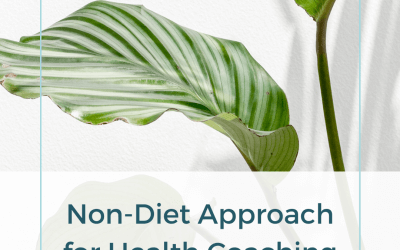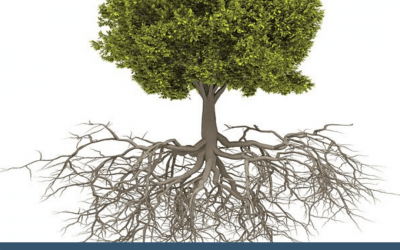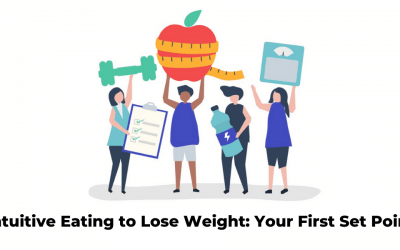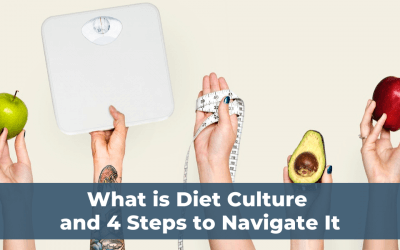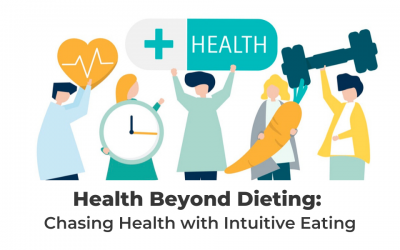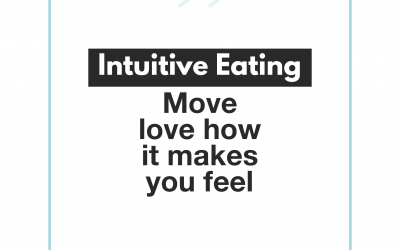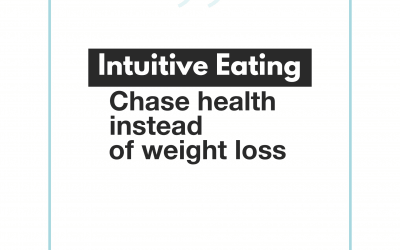Health Blogs
Non-Diet Approach for Health Coaching
When I first started in my nutrition practice the term “non-diet approach” didn’t even cross my mind. “Anti-diet approach” didn’t even exist. Unbeknown to me, I was practicing the “diet approach to nutrition” simply because that’s what was taught in health & nutrition school.
Fast forward close to 10 years now, a lot have changed. The non-diet approach is growing rapidly, so has the anti-diet approach and intuitive eating is booming.
So, let’s discover what is the non-diet approach.
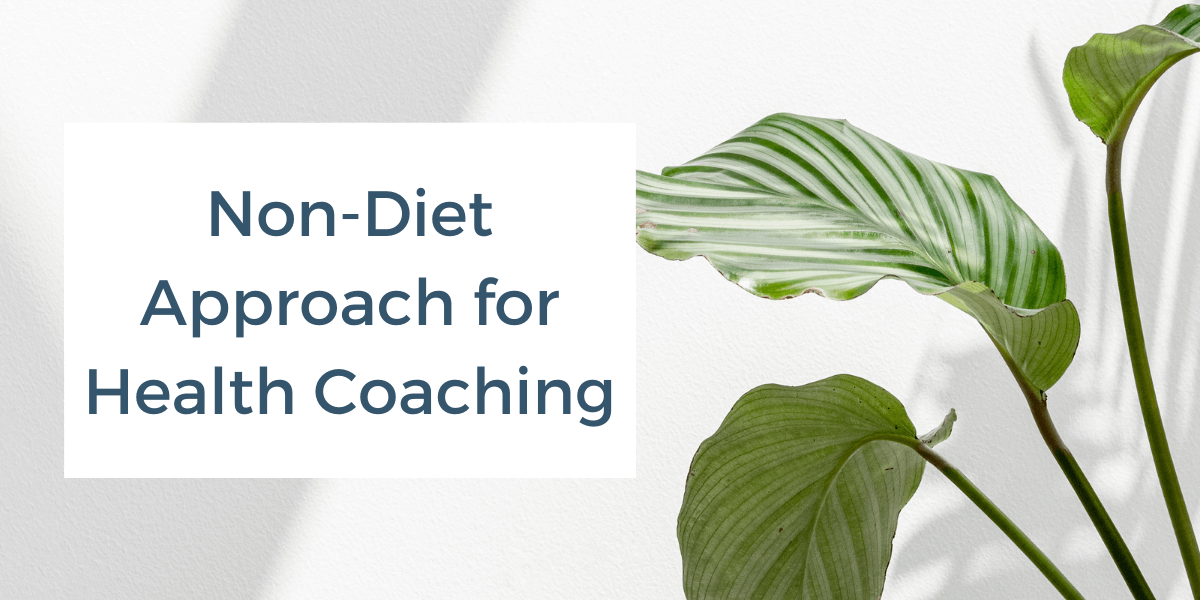

Core values of the non-diet approach
The pillars of the non-diet approach
Non-diet approach training for professionals
What is the non-diet approach?
The non-diet approach to health coaching & nutrition is the exact opposite of dieting. It recognizes that food, eating and body weight aren’t the problem to be fixed. It’s a weight-neutral approach to health instead of focusing on a weight-oriented outcome. This approach focused on all the other factors that can impact one’s health beyond body weight. In other words, the ultimate goal is to support the patients to become their own experts at their bodies.
The Going Beyond The Food Method™️ is our proprietary methodology that helps women to recover from diet culture and learn the non-diet way of life. Firstly, our 4 pillars are Body Wisdom, Body Trust, Body Respect, and Body Neutrality. Secondly, our framework is composed of 5 steps process: Intuitive eating, Body Neutrality, Self-Coaching, Emotional Intelligence, and Mindfulness.
Core values of the non-diet approach
The non-diet approach to health coaching and nutrition holds key core values: Fundamentally, it recognizes that diets do not work. It’s holistic in nature. It is focused on the Why not the What, it’s focused on finding solution that are based on love and compassion. Moreover, it believes that all humans and bodies are worthy.


Diets don’t work
A 2016 study by researchers at UCLA studied 40,420 adult participants in the most recent U.S. National Health and Nutrition Examination Survey. Researchers looked at the participants’ health as measured by six accepted metrics (not including BMI). These metrics are blood pressure, cholesterol, triglyceride, glucose, insulin resistance, and C-reactive protein.
The study found that 47% of people classified as overweight by BMI and 29% of those qualified as obese were healthy based on at least five of those other metrics.
Meanwhile, 31% of normal-weight people were unhealthy by two or more of the same measures.
A number of research studies show that weight loss is not necessary to improve physical health. Studies have also found that fitness is more predictive for mortality than weight. This study defined ‘fit’ as 3-4 hrs per week of walking.
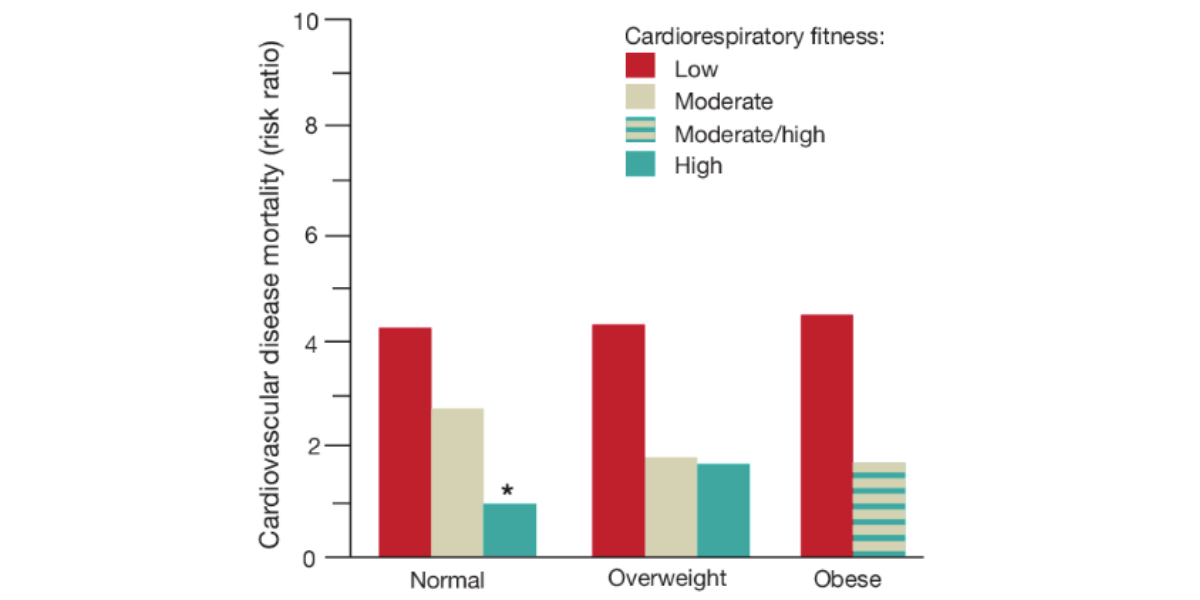

Note: “Fit” is not synonymous with “thin” or “lean.” That’s Diet Culture. Being fit means being in good health, especially because of regular physical movement.
Furthermore, trying to change your health status simply by losing weight has not only proven to be an ineffective approach but also carries potential negative side effects to your health. The focus on intentional weight loss via dieting can be harmful. Multiple studies demonstrate negative side effects of dieting behaviors. The three most documented negative effects are weight cycling, disordered eating, and weight stigma.
The non-diet approach for health coaching is holistic
The World Health Organization defines health as “a complete state of physical, emotional, and social well-being, not merely the absence of disease or infirmity.” The non-diet approach is a weight-neutral approach to health is based on the idea that your health status or risk level can’t be determined solely by your weight.
Instead it recognized that humans are more than a physical body: mental, emotional, spiritual and physical human bodies.
Its focus is on the WHY instead of the WHAT
The non-diet approach looks at the root cause of the behaviors. For example, when considering nutrition it considers why the individual is eating instead what the individual is eating. What we eat, how we eat and when we eat come second to why we eat.
Compassion versus fear-based threat
The non-diet approach will help the client switch his approach to health behavior to one of compassion for self. It will help form a relationship of respect towards one’s body helping the client to make choice based in love for body and self instead of fear (fear of disease, fear of weight gain, fear of other people opinion, etc…)
All humans are worthy; All bodies are worthy
The non-diet approach is grounded in the fact that all humans are worthy therefore all bodies are worthy. The non-diet recognizes the danger to one’s health when face with any stigma, discrimination or prejudice.
Therefore, the non-diet approach must be anti-discriminatory: anti-fatphobia, anti-racist, anti-sexist, anti-transphobia, anti-classist, non-binary, etc.
The pillars of the non-diet approach for health coaching
When practicing the non-diet approach to health and nutrition with clients, practitioners must follow a sequential order in their approach. Although adaptable in nature, some fundamental pillars must be in place
1. Investigation of belief and history
The first step is for the practitioner to have a clear understanding of the current state of their clients/ patients relationship to food and body. A number of assessments are available: Intuitive eating assessment, Body Acceptance Assessment and Dieting Impact Inventory.
Next, the practitioner will help the client understand how they go to be where they are right now using a dieting timeline. It’s very important for the patient to understand that it’s not their fault but instead diet culture.
2. Mindset & Unlearning Diet Culture
The next phase of the non-diet approach is the most important: unlearning. Unlearning the diet mindset, dogmatic beliefs about food and exercise, the thin ideal, etc..
When we trained professional inThe Going Beyond The Food Method™ our practitioners are trained in a Cognitive Behavior Therapy approach called Self-Coaching. This will be the tool they will teach their client to help them unlearn Diet Culture.
3. Attunement & Reconnecting
As the client progress in unlearning diet culture the next steps will be to help patient to reconnect with their body via body sensation. Using various mindfulness approach our graduates of our non-diet certification have a number of tools available to them to teach their client attuned with their body.
The first set of sensations we focus on with the clients are eating cues: hunger, fullness and satisfaction. Gradually, clients will be able to trust their own ability to read and interpret their innate body sensations.
4. Emotional Intelligence & Processing
As the client gets more attuned to her own innate body wisdom, the focus will shift to building skills set to process emotions & feelings. One of the most effective tools for this step is deconstruction of the eating behavior using two questions: What am I feeling? and What do I need?
The outcome of these pillars is to build emotional intelligence and shift the individual engagement with their emotions from Reacting to Responding.
5. Empowerment & Relearning
The non-diet approach is truly beyond the food and this next pillar is the reason behind this powerful transformative process.
To help build empowerment, the process of habituation will be use to help client regain power over fear foods. Gradually reclaiming their power at first with food and naturally expanding their empowerment to other part of their life using their inner wisdom.
6. Respect & Liberation
In this last step practitioner will support client in the process of rebuilding a relationship of respect with their own body. Engaging in body image healing using body neutrality and Health At Every Size approach to help build an inventory of health promoting behaviors.
At this point in the process client is also ready to re-engage with food using a gentle nutrition philosophy and with exercise using a joyful movement approach.
Non-diet approach training for professional
We have created a number of free non-diet approach training resources to help you begin learning more about this revolutionary health approach. Join my non-diet professional community by requesting our non-diet professional starter pack.
You can also listen to our non-diet podcast.
The non-diet approach mentorship program
The Going Beyond The Food non-diet approach mentorship program is a space where you can receive support guidance to become the best non-diet professional. It’s a program geared to refine your non-diet professional skills set and teach you the skills you need to build a successful business that can impact thousands of women. It will help you develop as a powerful leader and help other women come back to their power. You will learn how to harness your ability to support and help other women. As a result, you can impact thousands of other women and dismantle diet culture.


Non-Diet Approach FAQs
The non-diet approach to health & nutrition is the exact opposite of dieting. It recognizes that food, eating and body weight aren’t the problem to be fixed.
It’s a weight-neutral approach to health instead of focusing on a weight-oriented outcome. This approach focused on all the other factors that can impact one’s health beyond body weight. In other words, the ultimate goal is to support the patients to become their own experts at their bodies.
The non-diet approach to health and nutrition holds key core values: Fundamentally, it recognizes that diets do not work. It’s holistic in nature. It is focused on the Why not the What, it’s focused on finding solution that are based on love and compassion. Moreover, it believes that all humans and bodies are worthy.
1. Investigation of belief and history
2. Mindset & Unlearning Diet Culture
3. Attunement & Reconnecting
4. Emotional Intelligence & Processing
5. Empowerment & Relearning
6. Respect & Liberation
We have created a number of free non-diet approach training resources to help you begin learning more about this revolutionary health approach. Join my non-diet professional community by requesting our non-diet professional starter pack.
You can also listen to our non-diet podcast.
The Going Beyond The Food non-diet approach mentorship program is a space where you can receive support guidance to become the best non-diet professional. It’s a program geared to refine your non-diet professional skills set and teach you the skills you need to build a successful business that can impact thousands of women.
The Non-Diet Approach: What is it exactly?
But is the non-diet approach addressing the real root cause?
In the first three years of clinical practice, I thought I was addressing the root cause of my patient health concerns. I was asking a lot of questions and doing an in-depth assessment. My goal was uncovering the “real issue” that no other health professional had identified yet. This unidentified root cause was, as per my training in functional medicine, the reason why my clients were “still struggling”.
As I shared in Intuitive eating Mentorship – First do no harm although my patient had short term reliefs…. long term, their health wasn’t better. In fact, in many cases, it was worse.
So, was I really addressing the “real root cause”?
Why healing the root cause is so important
The Non-diet Approach Professional Training
If you would like to listen to the article in audio format, here’s Undiet Your Coaching Podcast Ep 5
Links mentioned in the episode…
Non-Diet Coaching Certification Program
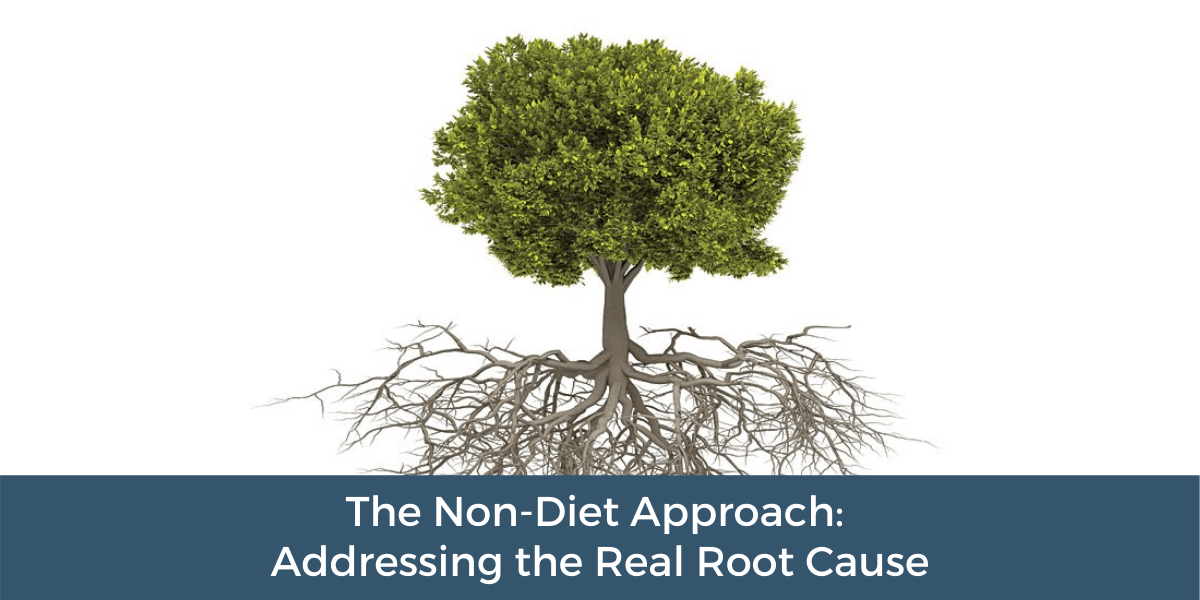

What’s the root cause?
In my training in holistic health & functional medicine, we are trained on addressing the underlying or root cause of chronic disease, taking into account the whole person including their environment, genetics, and lifestyle factors. Addressing the root cause is a fundamental philosophy, and honestly, the pride of alternative health approaches: resolving the root cause vs. just dealing with side effects.
Even beyond the health sector, the root cause is the cause of a problem. If adequately addressed, it will prevent a recurrence of that problem. By asking the question “why” a few times, the root cause of a problem is often identified as a procedural, or management, shortcoming.
For example, imagine you have a lot of weed growing in your lawn. If you remove the weed using a lawnmower, will that solve the problem? Temporarily, yes. Visually, your lawn looks good. However, you probably know that this is only at the surface level. After a short period of time, the weed will grow back. So, how do you fix this long term? If you replied “By removing the weed from the root,” then you are totally right!
As a nutritionist, people came to me to change their eating habits or to address health issues that they thought were caused by food. However, my training had taught me that the root cause was in the: what, when and how they ate.
What I couldn’t understand was why it wasn’t working? Why were my clients not able to adhere to the in-depth protocols? Why were they disappearing after a few sessions? And why, when I would see them a year or two down the road, they had reverted back to their old habits?
Why healing the root cause is so important
If I was healing the root cause, then this shouldn’t be happening. I knew this from my training. So, I started to research and quickly realize I wasn’t addressing the “real root cause” but still just the “ side effects”.
It’s understandable why we are inclined to deal with effects instead of the root cause. Effects are what’s most immediately observable, so it’s easy to act on them. Think here “size of body”. Upon doing so, you see an instantaneous change — an impression that you have progressed in your goals. When you go on a diet, you lose a small amount of weight immediately. That’s until the diet stopped working and you regain all the weight (most often more than the original amount of weight loss).
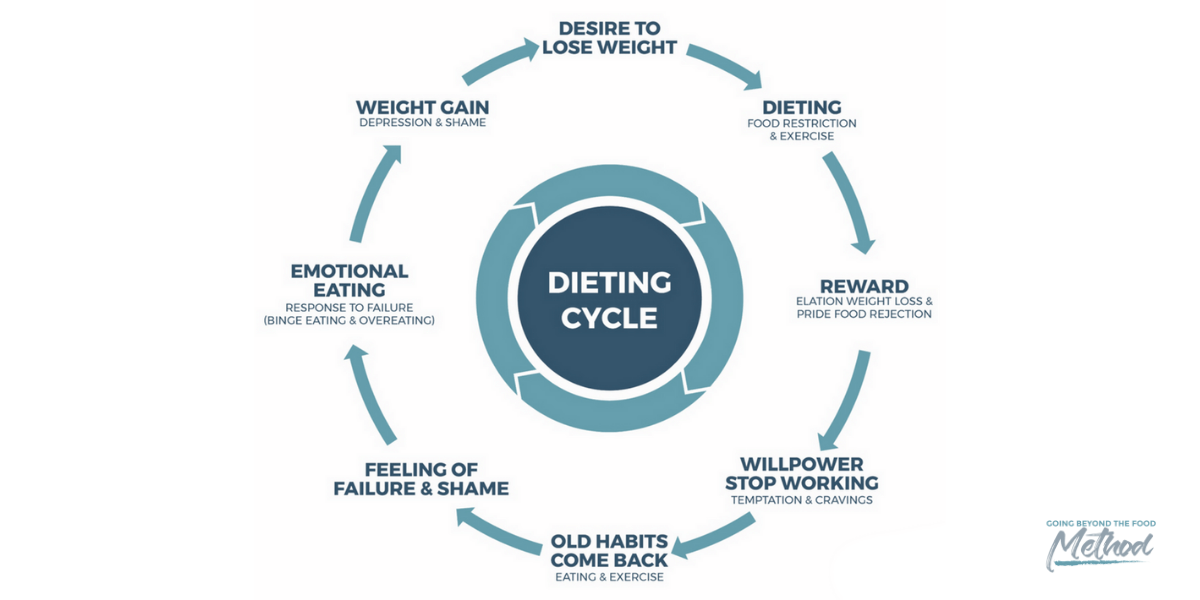

On the other hand, trying to uncover the root causes can be tedious, complicated, and at times, scary. Sometimes, to the extent where people run away when they realize the root cause problems that are underneath. Subsequently, addressing these root causes often requires a change of thinking and some pain and effort, but the results will be much permanent and higher-value than correcting side effects (symptoms as known in health).
As we touched in our S1 EP3 podcast episode Diet mindset professional training, we unpack how our certain traits of character are the results of dieting.
Here are just some of the real root causes:
- Perfectionism (Effect): Need to have “perfect” diet (Effect): Diet Cycle (Effect): Desire to lose weight (Effect): Body Dissatisfaction (Effect): beliefs about what body should look like (Cause): fatphobia/weight stigma (Cause)
- Low self-confidence (Effect): Need to lose weight (Effect): Perfectionist Body Fantasy(Effect): beliefs about what body should look like (Effect): fatphobia/weight stigma (Cause)
- Binge eating (Effect): food restriction (Effect): Dieting to lose weight (Effect) : fatphobia/weight stigma (Cause)
The root cause wasn’t in the what, when, and how they ate. It was in the why. In my first few years of practice, I stopped asking why too early in my investigation process. Even when I asked “Why do you eat like this?” “Why do you want to lose weight?”…I was blinded by my own fatphobia.
Fatphobia
Fatphobia is the fear and dislike of obese “fat” people and/or “obesity”. I was fatphobic and was profoundly afraid of gaining weight. In fact, I was professionally trained to believe that “fat” was the root cause of most chronic conditions. I was taught that everyone should be or want to be at a “normal BMI”.
Hence, I had to confront my own and discover the truth about body weight, BMI & health to be able to ask the right question with my patient and for my own recovery from diet culture.
Not only was my own fatphobia preventing from being the best health professional I knew I could be, but it also was keeping from accessing my best health. Fatphobia in research is also described as weight stigma. Research recognizes two forms of weight stigma:
Experienced weight stigma
This occurs when people observe or believe that others have made unfair negative assumptions about them or discriminate based on nothing more than their weight or body image.
Internalized weight stigma
This is the process by which people accept weight-based stereotypes and make them true about themselves. People who have internalized weight stigma are the harshest critic of themselves. They have come to believe that they are “less-than” because of their weight/ body image.
Research is pointing out that internalized weight stigma has the greatest impact on physical and mental health over experienced weight stigma.
“Some people fear that if people feel too good about their bodies and themselves, they will not be motivated to engage in healthful eating behaviors and physical activity. Studies show the exact opposite to be true: When people internalize weight stigma and feel bad about themselves because of their weight, they feel less confident in their ability to engage in healthful behaviors and are more prone to binge eating, avoiding physical activity, and other behaviors that contribute to weight gain.”
– Rebecca Pearl, PhD, an assistant professor of psychology at Perelman School of Medicine at the University of Pennsylvania in Philadelphia.
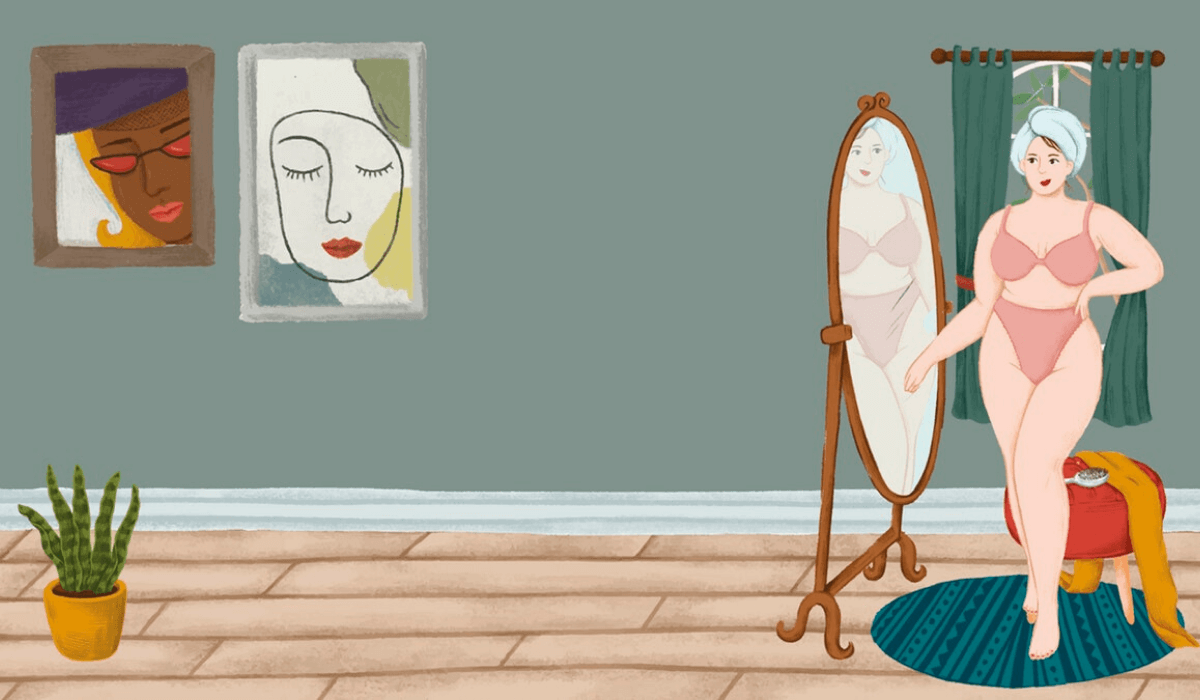

Weight stigma is the REAL root cause
Weight stigma is the negative attitudes and beliefs about people because of their weight. It leads to the labeling of people with stereotypes based on their weight. Unfortunately, it’s a common belief that weight stigma will motivate people who don’t meet body size ideals to change their behaviors, in order to avoid further stigma.
Weight stigma originated from the “old school” model of behavior changes through punishment or shaming. A great example of this today is the “before and after” picture we see so frequently on social media. They are unfortunately used by many health professionals.
Weight stigma is a centric element of diet culture. In fact, research has demonstrated that diet culture helps frame a larger body as a “health hazard”. I like to explain it to my students as the “goon” of diet culture. Without it, diet culture may stop existing.
Weight stigma has been researched extensively over the last 20 years. What research overwhelmingly shows is that weight stigma doesn’t encourage people to lose weight or improve their health. Instead, stigma leads to a greater risk of depression, poor body image, and self-esteem. It also leads to increased stress, disordered eating behaviors, and avoidance of physical activity.
Weight stigma has also been linked to many common health problems that were first associated with “obesity”. Is “obesity” or the stigma associated with “obesity” the true culprit? As you can imagine, experts and researchers are divided on this question. Since we acknowledge that weight stigma is causing the health issue, then diet culture will need to be condoned publicly… can you see the issue?
You can read more Cyclic Obesity Weight Based Stigma Model.
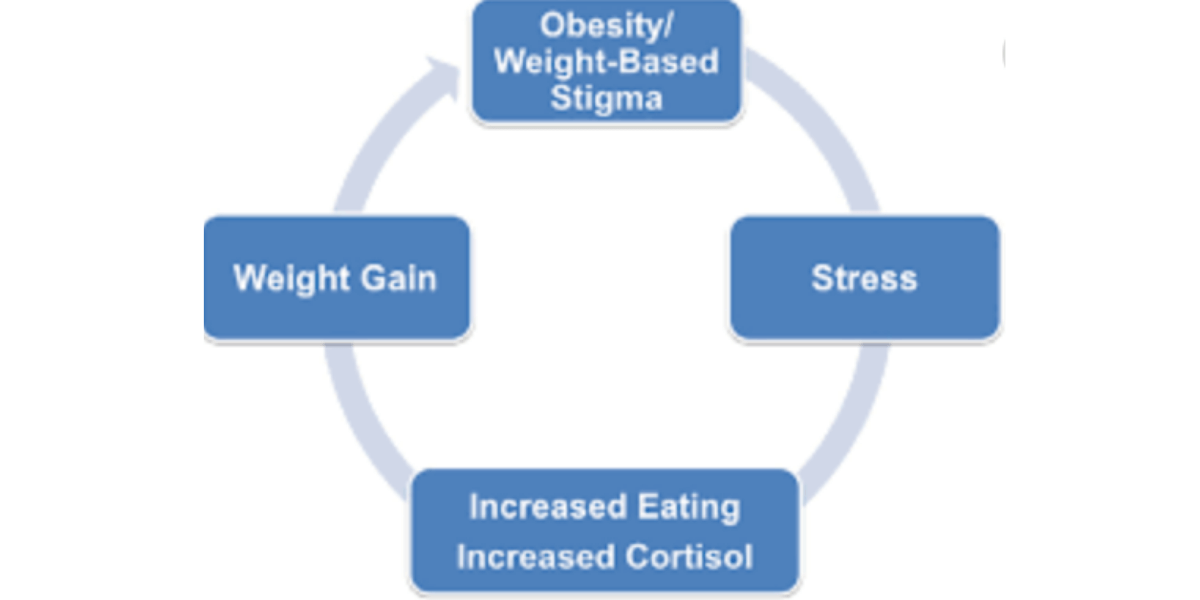

The Solution: Body Image healing
The only way to address the real root cause is to include body image healing in your practice/ program.
Making peace with my own body and healing my own body image was the path to releasing my own fatphobia. Doing so unlock my ability to end weight stigmatization in my own practice.
What most health professional doesn’t realize is that our individual body image is not only how we see ourselves when we look in the mirror. It’s also multidimensional. It encompasses:
- Perceptual body image: how you see your body
- Affective body image: how you feel about your body
- Cognitive body image: how you think about your body
- Behavioral body image: the way we behave as a result of our perceptual, affective, and cognitive body image.
Research is showing that a distorted body image leads to lower self-esteem, distorted relationship to food, depression, anxiety, hormonal disruption, and many other side effects. Many of our clients and patients come to see us for this in the first place.
Thomas F. Cash, PhD, is a true pioneer in the psychology of physical appearance research. He also developed today’s most effective treatment approach to body image issues, as well as many of the measures used in body-image research. Likewise, the body image healing cognitive-behavioral model is at the center of our proprietary non-diet approach, The Going Beyond The Food Method™️ .
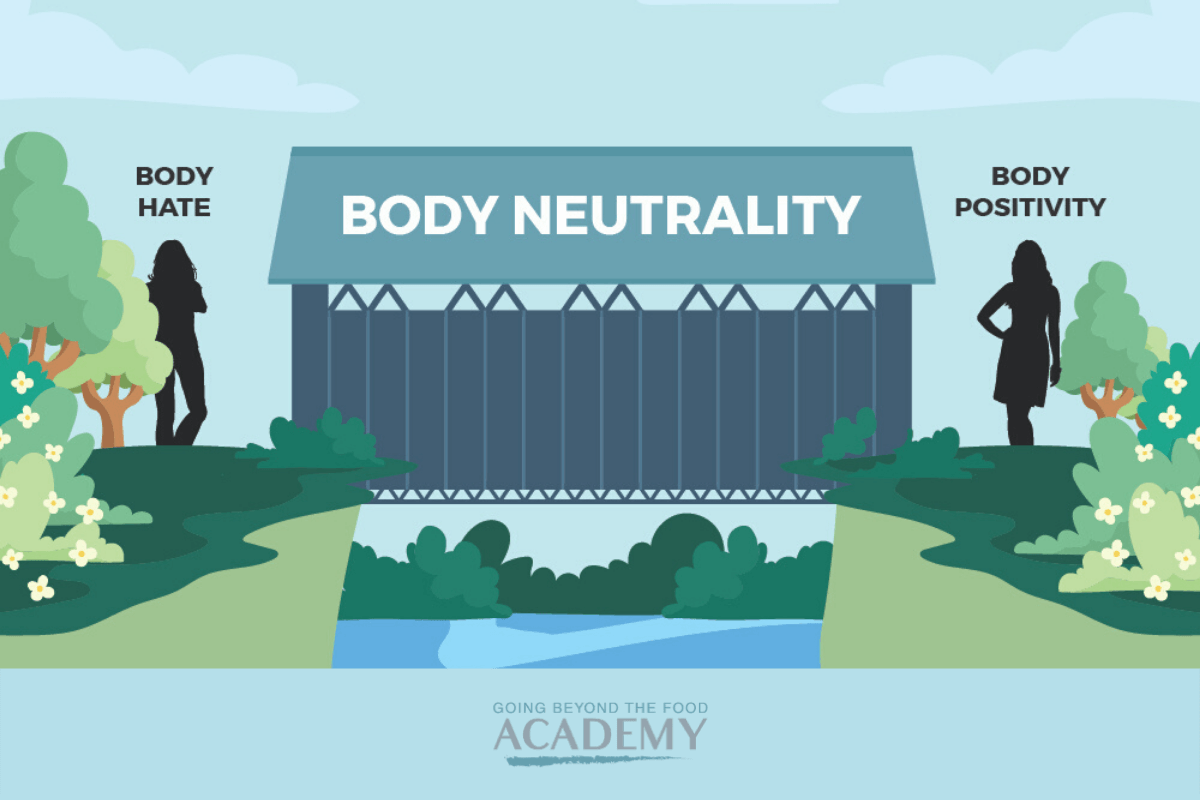

Body Neutrality
In our non-diet clinical approach, we teach our clients the body neutrality framework and not body positivity. It includes body image professional training, the body neutrality framework.
Body Neutrality empowers women to embrace themselves as they are, including the parts they don’t like about themselves. Its focus is to avoid self-hate while simultaneously relieving from the pressure of having to love their body. Most importantly, the goal is to respect and accept your body for what it is – and that’s it.
Body Neutrality is the middle ground between positivity and negativity (shaming). Embracing body neutrality over body positivity allows our clients to experience negative feelings about their bodies, but without the pressure that comes with having to be positive all the time.
Body Neutrality helps women detach their self-worth from their bodies (good or bad). It’s about crafting a relationship of functionality with our bodies and engaging with it from a place of self-care instead of control.
Health can be weight-neutral
The World Health Organization defines health as “a complete state of physical, emotional, and social well-being, not merely the absence of disease or infirmity.” A weight-neutral approach to health is based on the idea that your health status or risk level can’t be determined solely by your weight.
It acknowledges that your weight is determined by a complex set of genetic, metabolic, physiological, cultural, social, and behavioral determinants. Many of these factors are either difficult or impossible to change.
Instead of focusing on a weight-oriented outcome, weight-neutral programs teach you to take charge of the factors within your control. These factors include your thoughts and behaviors. In short, taking charge of these factors will help you improve your well-being, regardless of your weight.
Weight-neutral approaches to health like the non-diet approach have significantly decreased body dissatisfaction, disordered eating, and depression. They’ve also increased sustainable, enjoyable self-care behaviors such as eating and moving well in the long term.
A 2013 study by the Journal of Obesity found no link between body weight and the way we feel about ourselves. Yet, the findings show a link between how we feel about ourselves and the healthy activities we engage in. Meaning, the better we feel about our bodies the more likely we are to take care of them by eating well and being active, allowing us to create a positive cycle. Likewise, dissatisfaction with our bodies can discourage us from taking part in certain activities, eating properly to fuel our bodies and can eventually lead to weight gain.
The non-diet approach
The non-diet approach to health and nutrition recognizes that weight stigma is a contributor to one’s health. As professionals, we must address how our clients and patients relate to their body as the root cause before we can effectively address the effects ( eating and health habits).
The non-diet approach to health is the exact opposite of dieting. It’s a weight-neutral approach to health that instead focuses on a weight-oriented outcome. This approach focused on all the other factors that can impact one’s health beyond body weight. In other words, the ultimate goal is to support the patients to become their own experts at their bodies.
The Going Beyond The Food Method™️ is our proprietary methodology that helps women to recover from diet culture and learn the non-diet way of life. Firstly, our 4 pillars are Body Wisdom, Body Trust, Body Respect, and Body Neutrality. Secondly, our framework is composed of 5 steps process: Intuitive eating, Body Neutrality, Self-Coaching, Emotional Intelligence, and Mindfulness.
The non-diet approach professional training center
We have created a number of free non-diet approach training resources to help you begin learning more about this revolutionary health approach. Join my non-diet professional community by requesting our non-diet client assessment tools
You can also listen to our non-diet podcast.
You can access non-diet approach training here
The non-diet coaching certification program
The Going Beyond The Food non-diet coaching certification program is a space where you can receive support guidance to become the best non-diet professional. It’s a program geared to refine your non-diet professional skills set and teach you the skills you need to build a successful business that can impact thousands of women.
It will help you develop as a powerful leader and help other women come back to their power. You will learn how to harness your ability to support and help other women. As a result, you can impact thousands of other women and dismantle diet culture.
Ready to get started with the Non-Diet Approach?
You can access all of our services on our work with us page. We have a number of programs and service levels enabling us to serve most women:
Free Resources and Masterclasses: Get started and get to know us better!
Private coaching with Stephanie and her team Stephanie and her team of Certified Non-Diet Coaches are waiting to support you in a one-to-one setting with an individualized plan.
Non-Diet Coaching Certification for professionals ready to integrate the Going Beyond The Food Method™️ in their practice and for women wanting to become Certified Coach and build a business coaching other women beyond the food.
The Ultimate Guide to Intuitive Eating and Diabetes
At first glance, integrating intuitive eating and diabetes management may seem counter-intuitive. And for many reasons, most approaches to managing diabetes are based on weight loss and carbohydrate life-long restriction.
But there’s a major problem with these two approaches: a massive failure rate and unsustainability long term. As of today, diabetes is a noncurable disease, requiring that requires a treatment plan that can be maintained for the rest of your life. Unfortunately, dieting has a failure rate in a 2-5 years period.
And that’s when a weight-neutral approach to diabetes comes in!
Diabetes and weight-neutral approach to health
Switching from judgment to curiosity with food
Free Audio Guide to intuitive eating and diabetes
Intuitive Eating free mini-course
Diabetes Specific free resources
Diabetes and weight-neutral approach to health


A weight-neutral approach to health is based on the idea that your health status or risk level can’t be determined solely by your weight.
Moreover, it acknowledges that your weight is determined by a complex set of genetic, metabolic, physiological, cultural, social, and behavioural determinants. Many of these factors are either difficult or impossible to change.
Instead of focusing on a weight-oriented outcome to the management of diabetes, weight-neutral programs teach you to take charge of the factors that can help diabetes within your control.
So taking charge of these factors among many others will help you improve your well-being and management of diabetes regardless of your weight.
Here are just a few of these factors:
1. Stress management
Stress is an important contributor to pathological conditions in humans. And hormonal changes that occur during acute and chronic stress situations can affect glucose homeostasis. In fact, a large body of evidence supports an association between stress and hyperglycemia (diabetes).
2. Weight stigma
The experience of discrimination and stigma around one’s body has a direct influence on health behaviours and stress levels. And research is pointing at weight stigma as a major contributor to health outcomes including diabetes.
3. Movement
Consistent gentle & enjoyable body movement has proven time after time to reduce blood sugar dysregulation. Moreover, the recommendation from the American Diabetes Association is clear on the benefit of all forms of diabetes.
4. Body Dissatisfaction
Internalize weight stigma leads people to become increasingly dissatisfied with their bodies and make poor health decisions.
And a 2013 study published by the Journal of Obesity found no link between body weight and the way women feel about themselves. However, the findings show a link between how women feel about themselves and their health behaviours. In other words, the better they feel about their bodies, the more likely they are to take care of themselves leading to a better health outcome.
What is intuitive eating


When people ask what eating intuitively means, this is the definition that usually comes to mind: “a self-care eating framework that uses your body’s internal cues of hunger, fullness, and satisfaction to guide your eating behaviour.” It’s literally trusting your gut! Note that this intuitive eating definition emphasizes self-care and not weight loss.
Intuitive eating, an evidence-based approach to eating that allows you to be the expert of your own body. So this approach enables you to develop a healthy relationship with food and your body. And it teaches you to trust your ability to meet your own needs, distinguish between physical and emotional hunger, and ultimately develop body wisdom.
And eating intuitively is a well research process and proven health framework supported by more than 100 intuitive eating studies as of 2019.
Nutrition and Diabetes
There is no doubt that what we eat influences our blood sugar. And it’s a known fact that carbohydrates will increase our blood sugar level . However, not all carbohydrates have the same influence on the level of blood sugar.
Furthermore, studies are showing that individuals’ blood glucose levels respond very differently to different foods. So this is what we call bio-individuality. In other words, there’s no one “diabetic diet” for every person diagnosed with diabetes. And while there are definitely generalities with eating and lifestyle that can be helpful, there isn’t a one fit all approach.
An individual needs to explore what works for them and what doesn’t for them. So as life unfold the individual reaction to certain food will also vary and change with time.
This is how intuitive eating is the perfect approach to diabetes.

Switching from judgment to curiosity with food
Intuitive eating is part of a Health At Every Size™️ approach to diabetes and a global weight-neutral approach to health.
Intuitive eating will teach you to become curious about how certain food makes you feel. And to pay attention to how your blood sugar is post-meal, be attentive to how you feel after eating, and your overall level of energy.
Being an intuitive eater will allow you to engage with food objectively without judgment. So it puts you back into power when making your food choice. And it helps you build trust and respect for your body instead of fear and hatred.
Intuitive eating is really about switching to love instead of fear when it comes to food and diabetes.
Audio guide to Intuitive Eating and Diabetes
This audio guide (podcast) is a collaboration with two of my colleagues. Both are experts in the treatment of diabetes under the lens of Health At Every Size and Intuitive Eating.
Rebecca Scritchfield is a Washington DC-based Registered Dietitian Nutritionist and Certified Exercise Physiologist. And she has been practicing weight inclusive, HAES care since 2008. Also, Rebecca is the author of the book Body Kindness and the host of the Body Kindness podcast.
Glenys Oyston is a Los Angeles-based Registered Dietitian Nutritionist. And she has been practicing a HAES® philosophy since 2010 and has provided extensive diabetes education for the past five years. Also, Glenys is the co-host of the Dietitians Unplugged podcast.
What we cover in this free audio:
- Is weight loss the solution to treating diabetes ?
- 5 most frequent myths about diabetes debunk
- The Health At Every Size approach to treating diabetes
- Where to find resources to integrate a non-restrictive approach to preventing and treating diabetes.
Diabetes Specific Resource
Dr. Lindo Bacon has written a guide to help people navigate the journey of integrating the Health at Every size principle in their approach to diabetes management. You can access this free Health At Every Size guide here.
My colleagues Rebecca Scritchfield & Glenys Oyston both registered dietitians who know that self-care for diabetes doesn’t have to involve restriction and weight loss have created an education & support group. The Health at Every Size® (HAES®) Care for Diabetes education and support group can be accessed here.
Get started – Next steps
Are you are ready to learn more about how you can approach your health with a weight neutral lense?
You can access all of our services on our work with us page. We have a number of programs and service levels enabling us to serve most women:
Free Resources and Masterclasses: Get started and get to know us better!
Private coaching with Stephanie and her team Stephanie and her team of Certified Non-Diet Coaches are waiting to support you in a one-to-one setting with an individualized plan.
Undiet Your Life group coaching program is for women to learn how to eat intuitively, become body neutral, and learn self-coaching at their own pace while being supported in a group setting by Stephanie and her team of Certified Non-Diet Coaches.
Non-Diet Coaching Certification for professionals ready to integrate the Going Beyond The Food Method™️ in their practice and for women wanting to become Certified Coach and build a business coaching other women beyond the food.
Intuitive Eating to Lose Weight: Your Set Point First
“I’m done with dieting… I’ve had enough. I can’t go on one more diet!”
You’ve probably said that at one point. You start looking for an option. Then you find intuitive eating, and it sounds interesting! No more food restriction. You follow your hunger and fullness cues instead of counting calories. You want to try intuitive eating to lose weight… because food freedom sounds oh so appealing and exciting after years of dieting!
More and more women are turning to intuitive eating these days. It’s “cool” to be anti-diet, and even cooler to be an intuitive eater. Intuitive eating has been proposed as the next big “diet trend” in the next decade ahead…and that’s a big problem!
Typically, when we refer to “diet trend,” we refer to ways of eating to achieve weight loss. That’s what we expect, and for most of us, that’s what we seek. We think we need to lose weight. Notice that the keyword here is NEED. We want to lose weight and we don’t want to diet anymore so intuitive eating seems to be the perfect option.
It’s normal to want to lose weight


I want to validate those weight loss desires. Those desires to modify your body to fit the “thin ideal” are real and constantly encouraged in a society that is laden with weight stigma and fatphobia. It makes perfect sense that you have that desire and that you think you need to lose weight.
If you find yourself asking the question, “How can I practice intuitive eating and still lose weight?” then this post is for you. And so, I’m writing this blog post to help you understand what intuitive eating is about, how your body maintains a certain weight through your set point, why it’s useless to fight against this mechanism through dieting, and what you can do instead.
You will learn:
Will intuitive eating lead to weight loss?
Homeostasis and happiness set point theory
Identifying and manipulating your set point
How to get started with Intuitive Eating
What is Intuitive Eating?
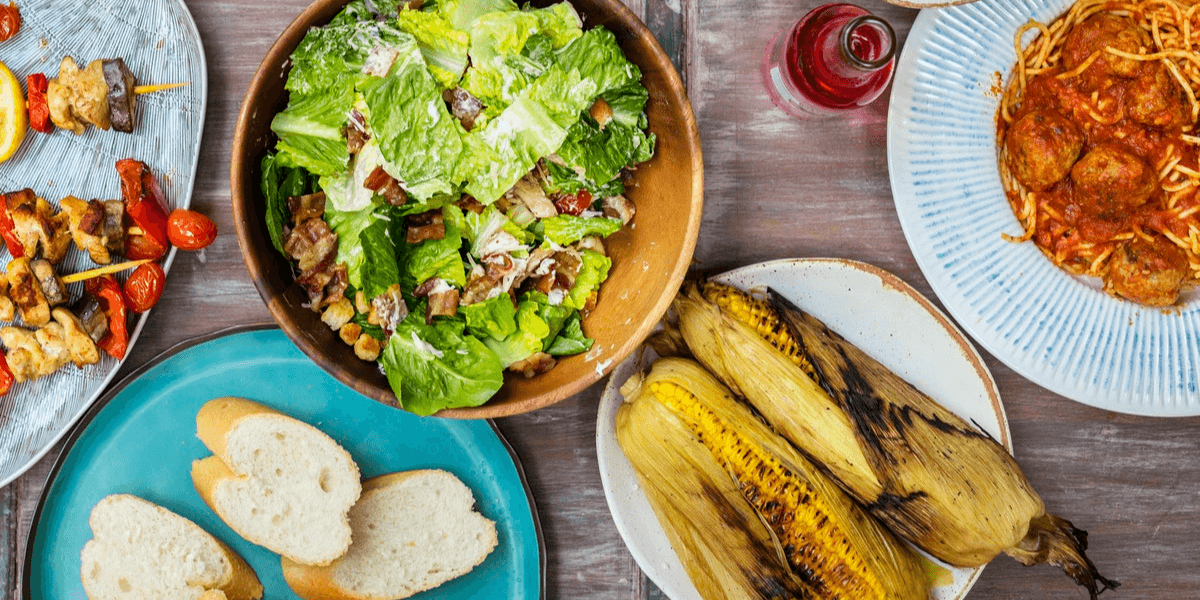

If people ask for an intuitive eating definition, this is what I usually give them: “a self-care eating framework that uses your body’s internal cues of hunger, fullness, and satisfaction to guide your eating behavior.” Notice that this definition emphasizes the body attunement element of intuitive eating, meaning that you need to listen to your body in order to eat intuitively.
This approach to eating allows you to develop a healthy relationship with food and your body. It teaches you to trust your ability to meet your own needs, distinguish between physical and emotional hunger, and ultimately develop body wisdom.
Should you try intuitive eating to lose weight?
If someone who claims to be a health professional tells you that you’ll lose weight with intuitive eating, run the other way! No health professional can rightly claim that Intuitive Eating leads to weight loss. I’ll explain why.
Rejecting the diet mentality is the first principle of intuitive eating. Focusing on weight loss will only hinder your progress as an intuitive eater.
Does that sound surprising? Well, it shouldn’t if you understand what eating intuitively means.
Intuitive Eating is based on interoceptive awareness or the ability to perceive physical sensations inside your body. This means, to be able to eat intuitively, you need to connect with your body and listen to your body’s “messages.”
In contrast, focusing on weight loss is based on external rules. It dulls your interoceptive sense and leads to body-doubt. It makes you think that something is wrong with you just because you’re not losing weight as you expected. Thus, you’re likely to think that intuitive eating “doesn’t work.”
While it’s true that some people lose weight when they eat intuitively, weight loss is more of a side effect rather than the focal point of intuitive eating. Some people who eat intuitively don’t lose weight, and that’s okay. Intuitive eating is weight neutral and is aligned with the Health At Every Size approach. (For more info on this approach, I recommend that you read the Health At Every Size book by Linda Bacon.
Time and again, research has proven that dieting for weight loss is not sustainable. Besides, it causes more harm than good to your body and mind. Dieting increases the risk of eating disorders, binge eating, weight cycling and weight stigma.
Intuitive eating to lose weight? Your set point first.
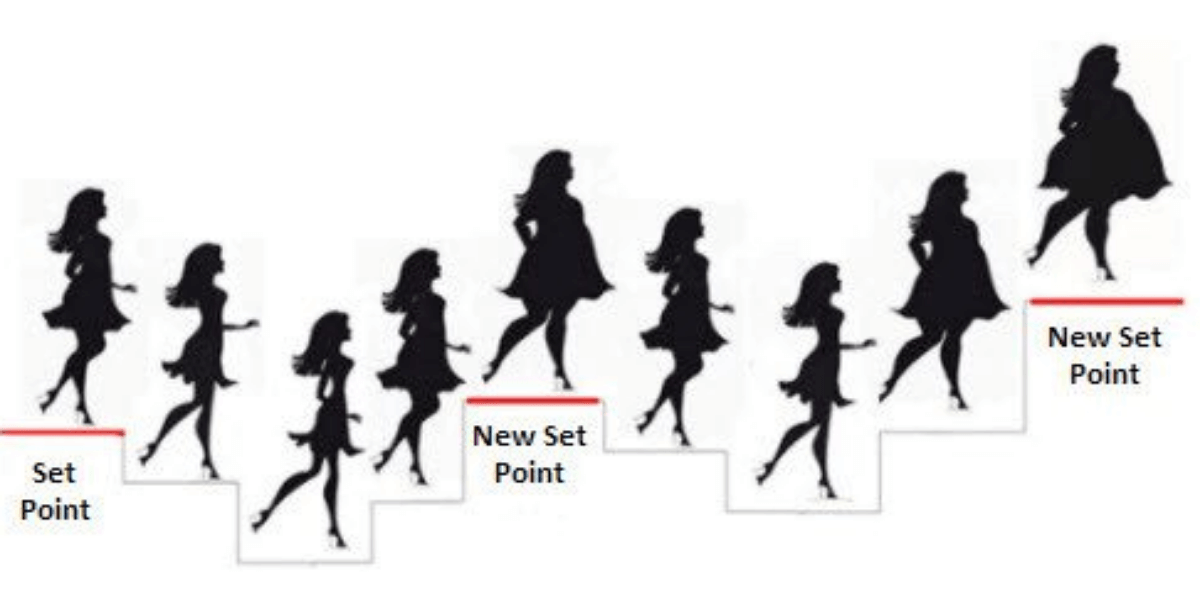

Think of your set point like a natural mechanism that your body uses to maintain a natural weight. This mechanism runs without your intervention. It’s just like how your lungs manage the appropriate amount of oxygen for your body or the way in which your heart manages your blood pressure.
Another fascinating analogy is how your brain automatically gets you steady on a bike even if it’s been 10 years since your last ride. It just happens without you having to think about it. Set point manages your weight in the same way.
In her book Health Every Size, Dr. Lindo Bacon describes our set point as the fat thermostat in our bodies. Your set point acts just like a heat thermostat in a room. When set to a certain temperature, the thermostat will send a message to the heating system to activate when below a determined temperature.
Your hypothalamus is the region of the brain that controls the system in your body that regulates your set point. It sends messages of hunger and fullness to manage your weight. Set point will make you think of the cookies in the cupboard and will also make you say no to the pizza when you’re full.
Our set point manages all the various components in the complex human body that create our body weight. Your set point is your ideal body weight, the body weight you manage naturally without food restriction, deprivation, and over-exercising. It is your weight between diets, the weight at which you can live a non-food or exercise-obsessed life.
The set point is the body’s internal system to maintain healthy weight. One 1970s research study showed that the average weight of a 60-year-old man was only four to five pounds more than the average 30-year-old man. That kind of weight maintenance is no accident and not the consequence of dieting either.
Set Point example
Dr. Bacon has this very powerful example in her book, Health at Every Size:
“Just consider a 50-year-old woman who weighs about five pounds more than she did when she was 20. If she eats about 2,000 calories a day over the course of 30 years, she takes in about 22 million calories. Since five pounds of body fat stores about 17,500 calories, that means that her body was just 0.08% off in balancing energy in versus energy out. This amounts to a difference of about 50 calories per month—less than the calories in one egg!” – Bacon, Linda. Health at Every Size: The Surprising Truth About Your Weight (p. 12).
Our set point can fluctuate during our lifetime. Currently, research estimates the fluctuation to be between 10 to 20 lbs. Set point fluctuates so it can maintain homeostasis.
If you are ready to explore Health At Every Size, you can download Dr. Bacon’s manifesto here.
Homeostasis and happiness set point theory
Homeostasis is the ability of the human body to maintain a stable environment. It’s key to our survival. The body’s magical ability to adapt to its environment at any given condition is what allows us to survive.
This ability to maintain balance is what maintains a stable body temperature, stable blood pressure, stable level of iron, blood glucose…and yes, body weight. All of these biological systems focus on maintaining homeostasis, a.k.a. balance, so we can survive and thrive in our environment.
It even goes beyond the physical body. Homeostasis is also what creates your thoughts and emotions. Your mind responds to its emotional environment as well.
The happiness set point theory is almost similar as the body weight set point theory. It suggests that our level of subjective well-being is determined primarily by heredity and by personality traits ingrained in us early in life. As a result, it remains relatively constant throughout our lives. Our level of happiness may change temporarily in response to life events. However, it almost always returns to its baseline level.
For humans, homeostasis means survival. Our bodies will do anything to bring us back to homeostasis so we can survive, including the dreaded weight gain.


Identifying and manipulating your set point
Are you at your set point right now?
That’s a very good question which unfortunately is not that easy to answer. How much fat protection your body requires (your set point) is the result of a complex interplay of genetics and the lifestyle choices you made today as well as in the past.
You see, at this time, we do not have a tool that will allow us to determine an individual set point. We also don’t have the knowledge on how to manipulate someone’s set point either. As of today, the complexity of the human body and the number of elements involved in managing one’s set point exceed our scientific capacity.
So to be clear, if you see a headline claiming to have the secret trick to lower your set point, like the 21-day set point reset detox, which I just saw recently, that’s 100% diet culture in action. It’s a lie! Don’t buy into it because it’s a scam. It’s just another gimmick from someone who wants to make money from your despair about your body weight.
What we do know is that if we want our body to settle at a natural weight that is effortless and healthy, we must make our brain feel safe. When the brain feels safe, it will send messages to the body that it’s safe. Will you lose weight? We do not know. No one actually knows. But what we know is that health arises or is maintained in a safe physical and psychological environment.
Why dieting is not the answer
When you go on a diet or when you exercise, you create an unsafe condition for your body.
The human body perceives intentional weight loss as a threat. That’s the reason diets don’t work. Your body will adapt to the starvation/deprivation period while you’re dieting and trying to lose weight.
But as soon as you release the pressure of the unsafe condition (i.e. you stop dieting or over-exercising), your body will come right back to your set point. In many cases, it will ensure complete protection from any further threat of weight loss.
So, what can we do? Based on all the current research that I’ve read, I’d like to suggest focusing on creating a relationship of trust and respect with the innate wisdom of your body. Create a safe environment, both psychologically and physically, in which you and your body can thrive in, not just survive.
The best place to get started is to educate and understand what could be perceived by your body as unsafe especially when it comes to food and body weight.
I would encourage you to get started by listening to episode 214 of the Going Beyond The Food podcast right up to the part where I recommend a tool to help you determine what could be impacting your set point.
Here’s a free checklist and resource to help you understand the set point theory and get started on your journey into a more trusting and respectful relationship with your body.
How to get started with Intuitive Eating
In all the years that I’ve been helping women as a clinical nutritionist, I’ve found that intuitive eating is the best starting point for developing a healthy relationship with food and one’s body. I’ve also made a part of my life. The women I’ve helped, as well as I, can attest that it’s positively life-changing!
I invite you to start your own intuitive eating journey and experience the same benefits that we’ve enjoyed from it. I have put together some resources that will help you get a good head start.
First, you can download my Get Started with Intuitive Eating Guide for free. It will teach you a 3-step process that will help you get started with intuitive eating right away.
Also, you can listen to the intuitive eating podcast episodes. Here, I share my best tips and interview experts who give their valuable insights on eating intuitively.
What is Diet Culture and 4 Steps to Navigate It
If you’ve been following me on social media or reading my blog, you certainly have come across the term “diet culture.” I’ve mentioned it many times before. But what is diet culture? How does it impact your life? And what should you do about it?
This article tackles this topic and teaches you how to opt-out of it. Also, I offer some resources that will help you start a new life outside of this oppressive belief system. Here’s what you’re going to learn from this blog post:
How to navigate the diet culture
Diet culture educational resources
Now, let’s begin exploring the diet culture so you can take your first steps to freedom!
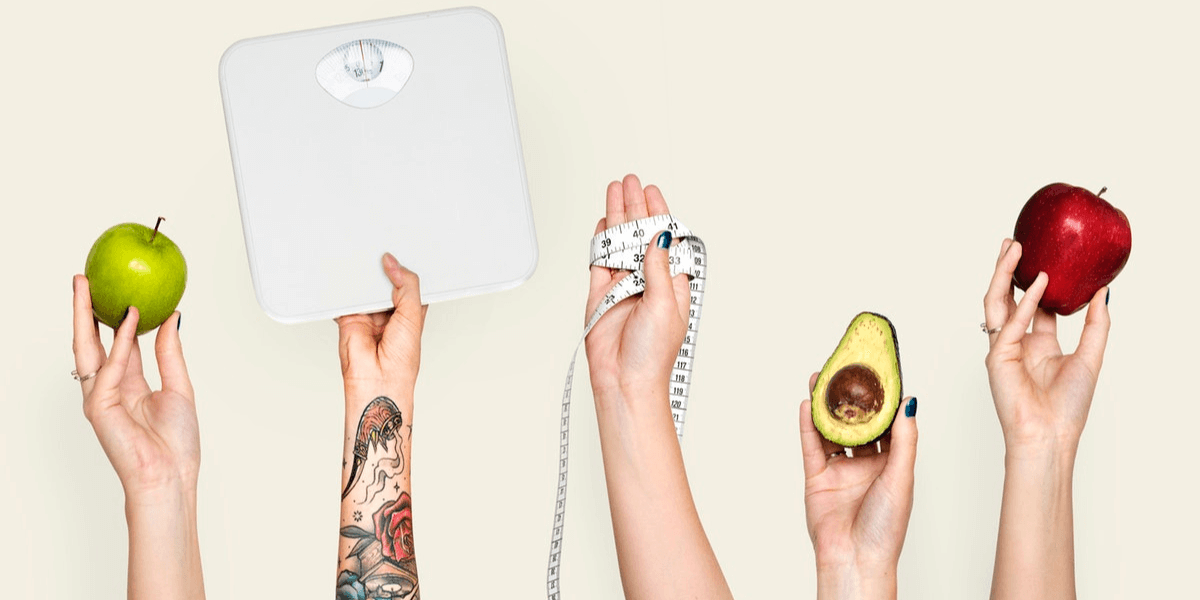

What is diet culture?
From the sound of it, you might think the term “diet culture” refers to a group of people who are on a diet. But it actually has a different meaning.
Christy Harrison, a colleague of mine, has the best diet culture definition. She defines it as a system of belief that worships thinness and equates it to health and moral virtue. It’s now prevalent in our society and oppresses women from all over the world!
How does this impact your life?
This means you may have spent your entire life thinking that you’re broken just because you don’t look like the impossibly thin ideal.
That’s just one angle. You can also look at the diet culture from three other angles:
The second angle is that it promotes weight loss as a means of attaining higher status. It makes you feel compelled, almost obligated, to spend massive amounts of time, energy, and resources, trying to shrink your body so you can fit into this thin ideal. Now, research is very clear that the dieting model has a 95 percent failure rate, so it might as well be an exercise in futility.
The next angle is it demonizes certain ways of eating while elevating others. It forces you to be hyper-vigilant about your eating, shames you for making certain food choices, and distracts you from the pleasure of eating as well as from your purpose and power.
Last but not least, it oppresses people who don’t match the supposed picture of health or the thin ideal. This affects us most particularly as women, although it’s starting to affect men.
My 25-year journey inside diet culture
As you probably know, I used to have a love-hate relationship with food and my body. A 25-year career in dieting left me obsessed, frustrated and confused about food. I was also at a loss on how to take care of my body.
Dieting was stealing my life and at 39. Then I decided that I had enough… I finally chose to take my power back and free myself from dieting and body shaming. The Going Beyond The Food Method™️ was born out of my personal journey.
Now, as a health professional, I’ve helped hundreds of women work their way out of this oppressive culture and develop a healthier relationship with food using intuitive eating and body neutrality.
Is diet culture affecting you, too? I invite you to consider its impact on your life. Take our quick self-assessment tool we created to help women determine if intuitive eating is the right solution for them.
How to navigate the diet culture
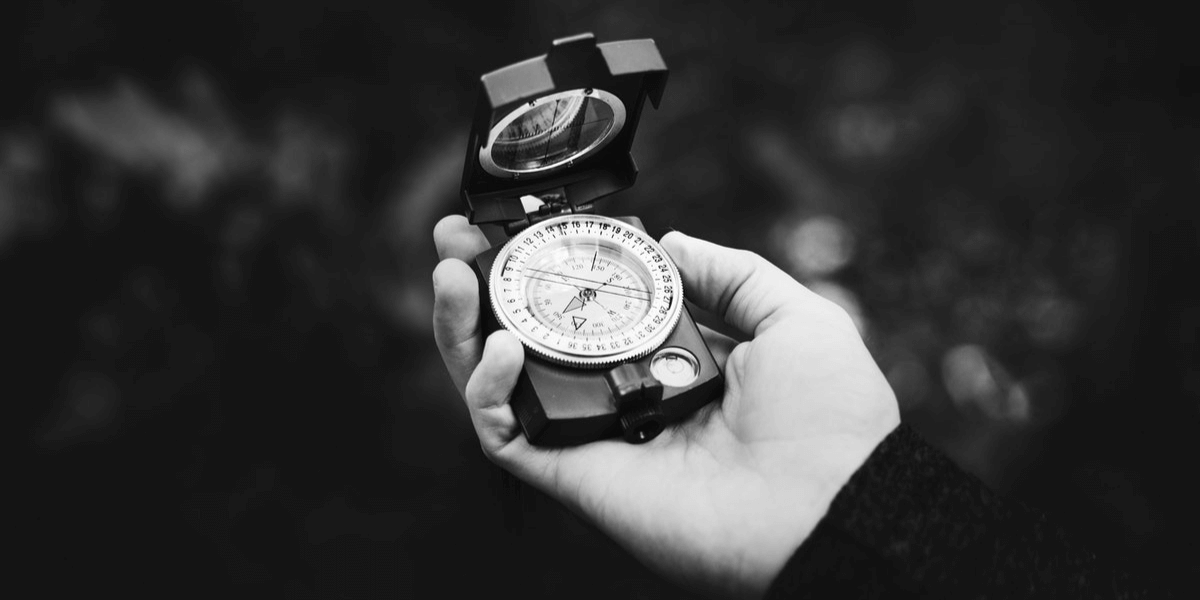

I invite you, and honestly all women, to become diet culture dropouts! Below are the four steps you need to take in your journey towards freedom:
Understand that you have a choice.
Now is the best time to be a woman. Unlike the generations before us, we’re liberated and empowered! You have to understand that diet culture is a tool that the patriarchy uses to keep us from being in our power. It keeps us busy minding our calories and macros. It induces guilt and so we feel inclined to punish ourselves when we fail.
Whether you want to stay in the diet culture and be oppressed or to break away from it and change your life, it’s totally up to you. But you should know that you have the power to make that choice.
Take responsibility.
With great power comes great responsibility. Now, that sounds like a quote from a Spiderman movie, but as an empowered woman, you are responsible for your life. No one else is!
Now, you can be the victim of diet culture and drown yourself in self-pity and helplessness. Or you can say, “Screw this! I’m going to take responsibility, and I’m going to work myself out of it and change my life.”
It’s your call.
Educate yourself.
Read books and blogs. Listen to podcasts. Consume content that supports the choice that you’ve made for yourself. Be on guard against the content that might suck you right back into the diet culture. As I’ve said before, beware of diet culture programs disguised as wellness practices.
I’ve made it my personal mission to empower women by educating them so they don’t allow themselves to be oppressed. And so, I have put together some resources for you.
We have anti-diet culture podcast episodes on the Going Beyond the Food Show, where I interview health professionals. I invite you to listen as they share their expert insights and opinions on our relationship with our bodies and with food.
You can also read our anti-diet culture blog posts on this website. Here, we go deep into the research and the studies around diet culture as well as dieting and its impact on health.
If you’re looking for an anti-diet culture book, I recommend Health At Every Size by Linda Bacon, PhD. Dr. Bacon does research around health and dieting. It’s a book that gave me a lot of “aha moments” and subsequently changed my life.
Find a framework to help you reconstruct your relationship with food and with your body.
You’re going to shift from the way of life that diet culture has taught you to a more empowering way of thinking and doing things. This means there’s a lot for you to unlearn and relearn, so you’re going to need all the support you can get.
The Going Beyond The Food Method™️ is a 5-step strategic process to help women move out of diet mentality and into self-care. Our 5 pillars are: mindset, emotional wellness, mindfulness, body neutrality and intuitive eating.
Diet culture educational resources


As a clinical nutritionist, I’ve found that intuitive eating is the most effective tool for developing a healthy relationship with food and your body. Intuitive eating teaches you to tap into your innate hunger and fullness cues. It requires you to relearn how to engage with food without restriction and without labeling food as “good” or “bad.”
The trauma around body image is more powerful than the one around food. What I have found over the years is that when we work through our relationship with food, it’s a lot easier and faster to heal body image issues.
We offer a variety of programs that will help you should you decide to opt-out of diet culture:
You can access all of our services on our work with us page. We have a number of programs and service levels enabling us to serve most women:
Free Resources and Masterclasses: Get started and get to know us better!
Private coaching with Stephanie and her team Stephanie and her team of Certified Non-Diet Coaches are waiting to support you in a one-to-one setting with an individualized plan.
Undiet Your Life group coaching program is for women to learn how to eat intuitively, become body neutral, and learn self-coaching at their own pace while being supported in a group setting by Stephanie and her team of Certified Non-Diet Coaches.
Non-Diet Coaching Certification for professionals ready to integrate the Going Beyond The Food Method™️ in their practice and for women wanting to become Certified Coach and build a business coaching other women beyond the food.
Health Beyond Dieting: Chasing Health With Intuitive Eating
Health beyond dieting seems to be a foreign concept to most people.
Diet culture conditioned us to believe that thinner is better in all aspects of life including our health. We’ve always heard that thin equals healthy, and that dieting is the way to a thinner body.
We’ve also been brainwashed into thinking that a thinner body is more attractive because it is associated with health.
This is a belief that’s hard to let go.
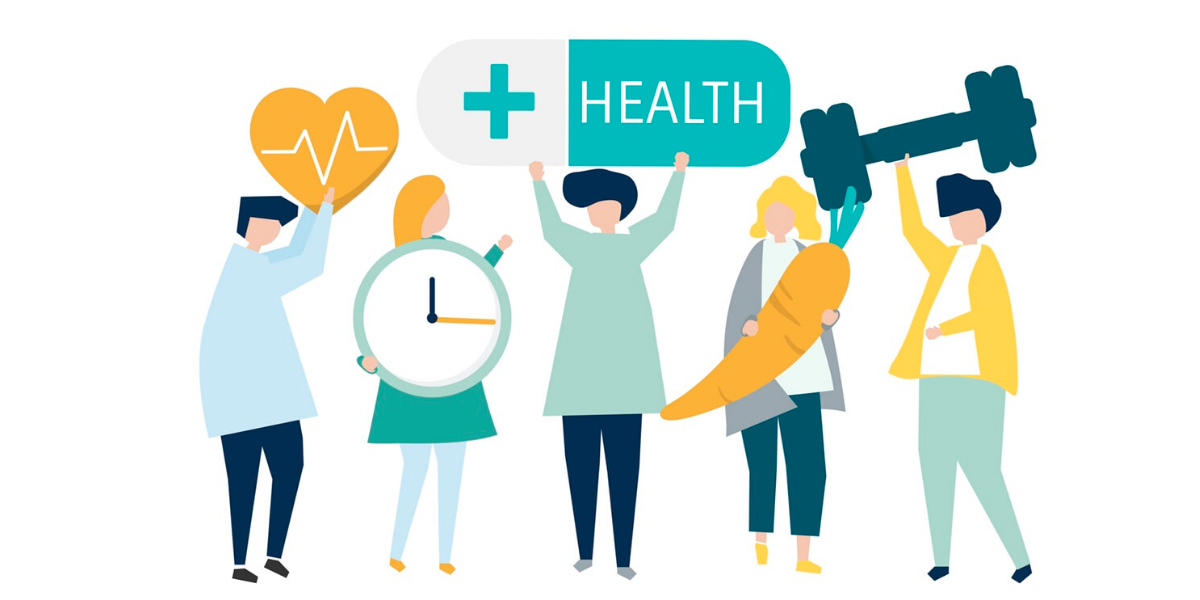

Why It’s Hard to Change Your Beliefs About Weight and Health
Your reptilian brain is the reason why it’s not easy to let go of beliefs. It’s the most primal part of your brain that has the survival instinct. It seeks to protect you from danger. Because the diet culture has programmed your reptilian brain into believing that fat people aren’t healthy, you’ve since associated health with thinness.
But as you’ll see, there is evidence that proves that your body size has little do with your health outcome. That said, it’s going to require some effort to reprogram your reptilian brain to fully accept the belief about health beyond dieting.
In this article, you’ll find answers to the following questions regarding health beyond dieting and the Going Beyond The Food Method:
- Who is the ideal candidate for The Going Beyond The Food Method™️ Health approach?
- How to get started with a weight-neutral approach to health
What does it mean to be healthy?
We all grew up with the idea that health is the absence of illness. But the World Health Organization has a definition of health that’s different from what we’re all used to. WHO defines health as “a complete state of physical, emotional and social well-being, not merely the absence of disease or infirmity.”
Good health is essential to being able to handle stress and live a long and active life. It doesn’t just refer to the absence of disease, but also to the ability to recover from illness, to adapt to life challenges in general.
When you’re healthy, it doesn’t mean you’re never sick. Humans have the innate capacity to adapt and recover from sickness and health issues. That is to say, being healthy allows you to recover and bounce back quickly.
Does “obesity” cause one to be unhealthy?
The keyword here is CAUSE. Before we can answer the question, we must first understand the difference between Correlation and Causation. For example, smoking is correlated with alcoholism, but it doesn’t cause alcoholism. However, smoking causes an increased risk of developing lung cancer.
As of 2019, there isn’t any evidence that directly points to obesity as a causative factor in a disease. That said, many studies link or correlate obesity to health risks. Even when body weight is correlated to health risks, it is never the sole factor of any health condition.
For example, research also found that obesity does not affect the risk of having coronary heart disease and stroke “Metabolic status is relatively stable despite rising BMI”. (However, it does increase the risk of developing diabetes)
But if the question is, “Is obesity associated or correlated with health risks?” the answer would be yes. If the question is “Is obesity causing disease?” the answer would be no. That’s where the big difference lies.
Here’s where it gets interesting – one-third to three-quarters of people classified as obese are actually metabolically healthy. Being metabolically healthy means having your blood pressure, cholesterol, glucose levels, and other metabolic markers within the normal range.
Is health beyond dieting possible?
Yes, and scientific research proves it!
A 2016 study by researchers at UCLA studied 40,420 adult participants in the most recent U.S. National Health and Nutrition Examination Survey. Researchers looked at the participants’ health as measured by six accepted metrics (not including BMI). These metrics are blood pressure, cholesterol, triglyceride, glucose, insulin resistance, and C-reactive protein.
The study found that 47% of people classified as overweight by BMI and 29% of those qualified as obese were healthy based on at least five of those other metrics.
Meanwhile, 31% of normal-weight people were unhealthy by two or more of the same measures.
A number of research studies show that weight loss is not necessary to improve physical health. Studies have also found that fitness is more predictive for mortality than weight. This study defined ‘fit’ as 3-4 hrs per week of walking.
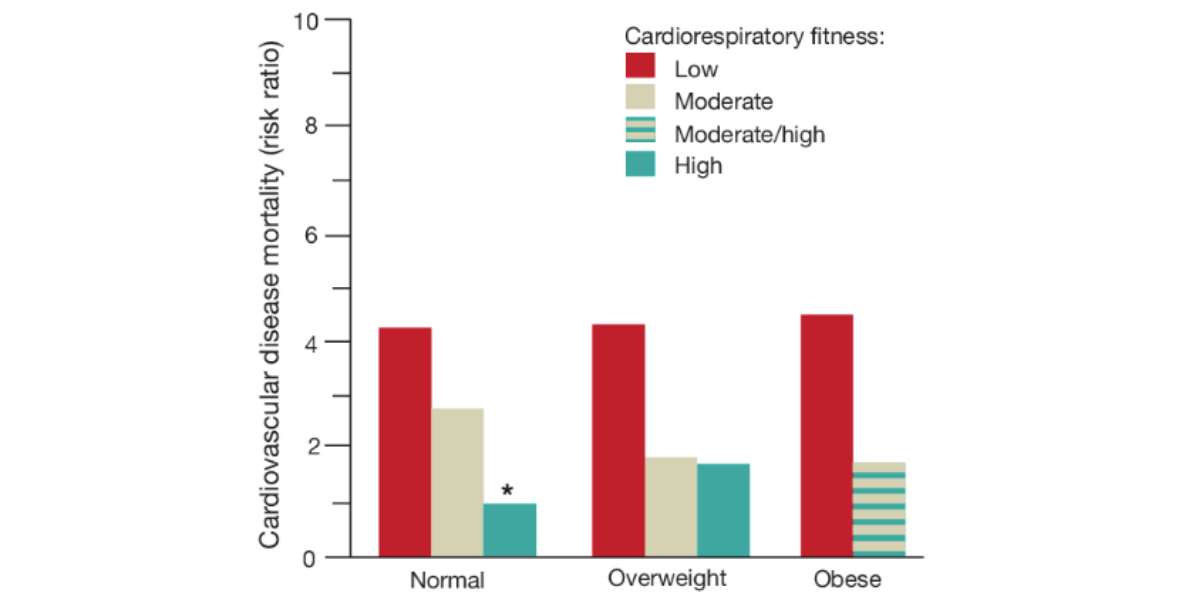

Source: JAMA. 1999 Oct 27;282(16):1547-53.
Note: “Fit” is not synonymous with “thin” or “lean.” That’s Diet Culture. Being fit means being in good health, especially because of regular physical movement.
Furthermore, trying to change your health status simply by losing weight has not only proven to be an ineffective approach but also carries potential negative side effects to your health. The focus on intentional weight loss via dieting can be harmful. Multiple studies demonstrate negative side effects of dieting behaviors. The three most documented negative effects are weight cycling, disordered eating, and weight stigma.
What is Health At Every Size?
As a response to the failure of the traditional weight-loss model of health, the Health at Every Size (HAES) movement emerged over the last decades.
Health At Every Size is a philosophy and an approach to health. Linda Bacon, PhD, an advocate for body positivity, wrote the book Health at Every Size: The Surprising Truth About Your Weight. It shows through research that health behaviors influence health more than weight.
The HAES movement promotes the simple truth that all bodies are good bodies. It shifts the focus away from dieting for weight control. Instead, it steers you toward self-care practices that support your body’s natural wisdom and vitality.
Chasing health at any size is possible. Dr. Bacon had led research to support the Health At Every Size approach to health with positive outcomes over the traditional model of intentional weight loss.
Honoring your body, and being able to understand your body’s needs, leads to meaningful changes in health behaviors.
HAES subscribes to the idea of health as stated by the World Health Organization—that it is more than just the absence of disease. It also sees health as a continuum that varies throughout one’s life span. Health, in this model, is from a holistic perspective (physical, psychological, relational, and spiritual).
In fact, the Health At Every Size approach discourages judging others and oneself regarding their health status. It acknowledges that shame and oppression can have significant negative effects on one’s health and wellness.
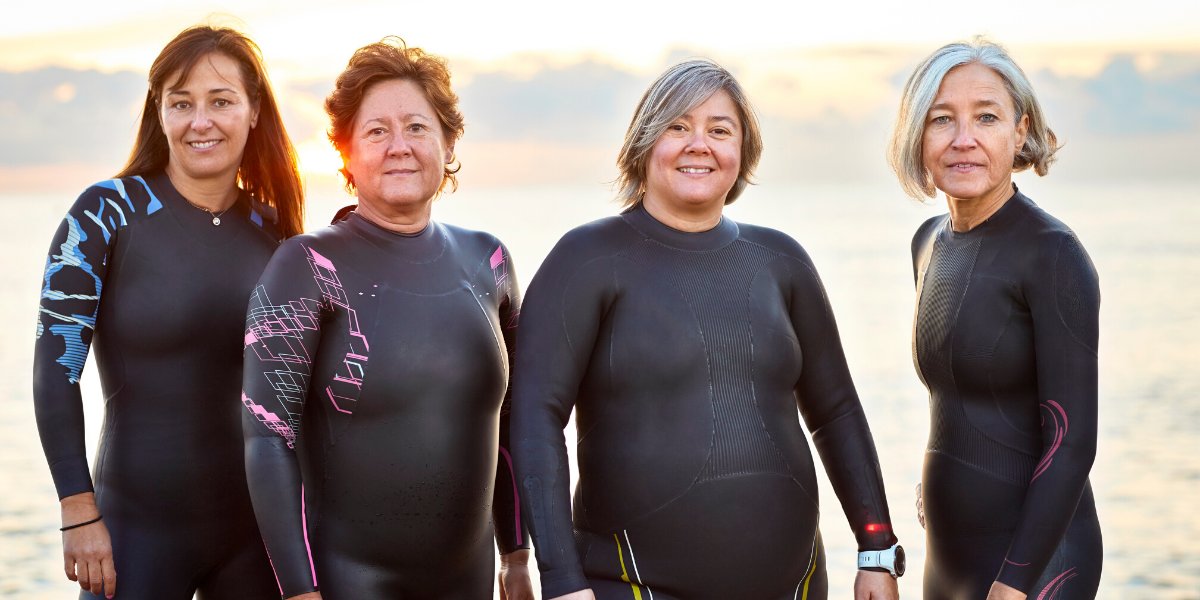

What is a weight-neutral approach to health?
A weight-neutral approach to health is based on the idea that your health status or risk level can’t be determined solely by your weight.
It acknowledges that your weight is determined by a complex set of genetic, metabolic, physiological, cultural, social, and behavioral determinants. Many of these factors are either difficult or impossible to change.
Instead of focusing on a weight-oriented outcome, weight-neutral programs teach you to take charge of the factors within your control. These factors include your thoughts and behaviors. Taking charge of these factors will help you improve your well-being, regardless of your weight.
Weight-neutral approaches to health have significantly decreased body dissatisfaction, disordered eating, and depression. They’ve also increased sustainable, enjoyable self-care behaviors such as eating and moving well in the long term.
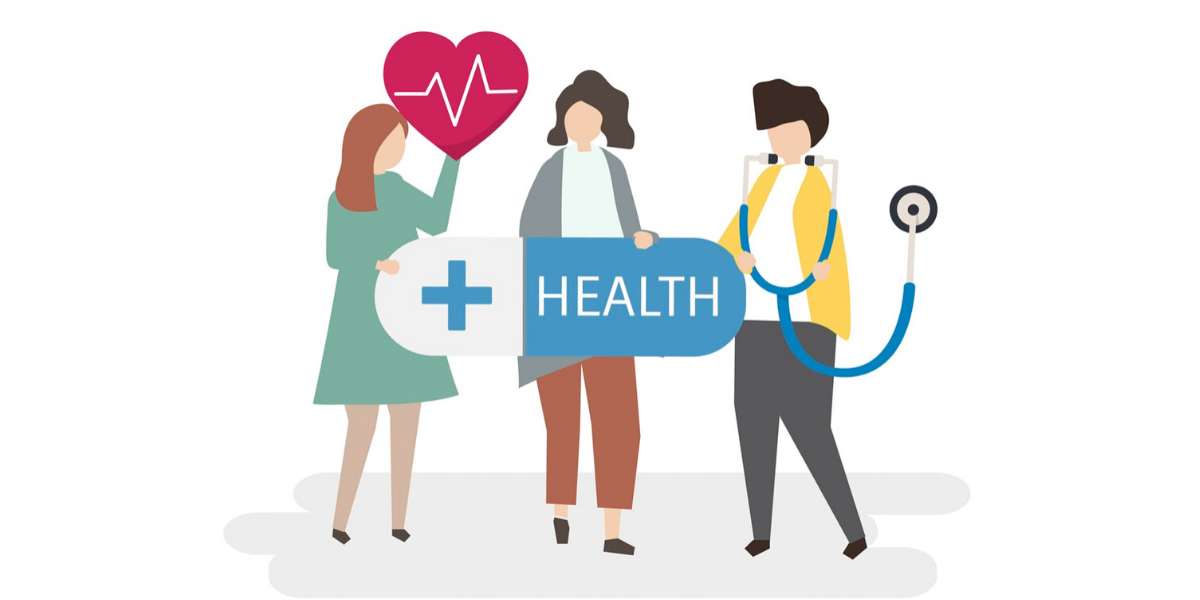

Body dissatisfaction and shame: Their effect on health behaviors
Weight stigma (also known as body shaming, or weight shaming) is the social devaluation, denigration, and discrimination of people perceived to carry extra weight based on their weight.
It originated from the “old school” model of inducing behavioral changes through punishment or shaming. A common example today is the “before and after” pictures we often see on social media.
It’s a common belief that weight stigma or shaming will motivate people who don’t meet body size ideals to change their behaviors so as to avoid further stigma.
As a result, many women internalize weight stigma and become increasingly dissatisfied with their bodies.
A 2013 study published by the Journal of Obesity found no link between body weight and the way women feel about themselves. However, the findings show a link between how women feel about themselves and their health behaviors. In other words, the better they feel about their bodies, the more likely they are to take care of themselves leading to a better health outcome.
Conversely, body dissatisfaction discourages women from taking part in certain health-related activities and from eating properly to fuel their bodies. These behaviors could eventually lead to weight gain… cynical right?
Shifting from weight management to health behaviors
Instead of focusing on weight management to improve your health, what if you shifted your focus to health behaviors?
For example, what if you cared more about the quality instead of the quantity of the food you eat?
What if you improve your mindset and thoughts so you can be better motivated to move your body every day?
What if you take steps to reduce and manage stress so that you can enjoy a better quality of sleep?
Research associated healthy lifestyle habits to a significant decrease in mortality regardless of baseline body mass index. Therefore, all BMI groups can benefit from practicing healthy habits. Interestingly, the greatest benefit is seen within the BMI “obese” group.
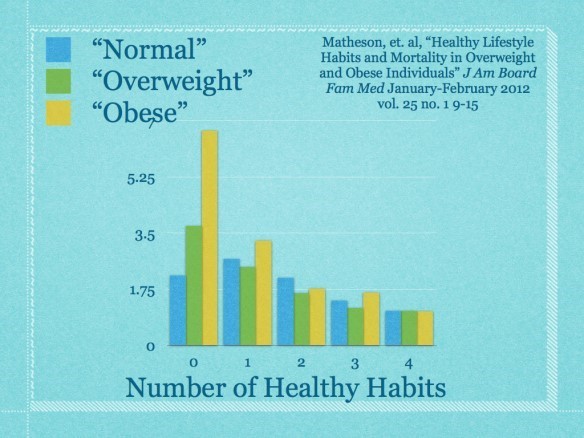

The Going Beyond The Food Method️ is a weight-neutral and non-diet health framework composed of eight core elements. Our health framework is grounded in holistic principles and functional medicine approach to health. It also follows Health at Every Size principles.
What happens if we take the Going Beyond The Food Method™️ approach to health?
The Going Beyond The Food Method is a proprietary methodology that I created. The program is primarily designed to help women make peace with food and their body. As a result, women are able to focus their efforts on health outcomes beyond dieting and weight loss. Certainly, it’s a five-step process that includes mindset, emotional regulation, mindfulness, body neutrality, and intuitive eating.
The method️ is based on four core pillars: Body Wisdom, Body Trust, Body Respect, and Body Neutrality.
The health behaviors we teach inside our programs center around intuitive eating, a well-researched self-care eating framework. Moreover, it teaches Body Neutrality, a framework that neutralizes body dissatisfaction.
Sustainability and health beyond dieting
The single most powerful advantage of a weight-neutral and non-diet approach like the Going Beyond The Food Method️ is sustainability. It helps you develop the ability to sustain health-promoting behaviors throughout your life. Our unique approach, combined with the evidence-based health benefits of intuitive eating, is very powerful!
Certainly, when it comes to health, consistency is significantly more powerful than short-term results. One of the secrets to consistency is self-compassion.
A 2015 study systematically reviewed a weight-neutral and no-diet approach to health. It determined the overall effects on factors including weight, biochemical measures, food, activity, behavior, body image, and mental health.
- Weight stability (in 5 yrs)
- Improved biochemical markers
- Cholesterol, blood sugar, blood pressure, CRP
- Sustained healthy behaviors
- Improvement in:
- Dietary quality
- Psychological states
- Disordered eating patterns
- Self-esteem
- Depression
The Going Beyond The Food Method framework supports health-promoting behaviors and makes health beyond dieting possible. It encourages the increase of fruit and vegetable intake and variety in diet. In addition, the framework aims to encourage health behaviors such as physical activity, stress management, sleep quality, and digestive health.


Who is an ideal candidate for the Going Beyond The Food Method™️ approach to health?
Truly anyone! Individuals who’ll benefit most from this approach are:
- Chronic dieters.
- Women who are overly concerned with weight and shape (a.k.a. body image issues).
- Women who are repeatedly trying to lose weight and restricting food for two years or more.
- Women who have had enough of dieting and regaining the weight that they lost.
- Women who are intuitive eaters.
- Women who have disordered eating behaviors.
If you have an eating disorder, I recommend that you work with a qualified health practitioner first. Bring yourself to safety and lay the groundwork with a health practitioner in a one-on-one setting.
Then you can come to one of our programs to learn the mindset piece of health beyond dieting.
Health beyond dieting: How to get started with a weight-neutral approach to health
You can access all of our services on our work with us page. We have a number of programs and service levels enabling us to serve most women: The #1 ressource I’d like to point you toward
Health Beyond The Scale Masterclass: Learn how to implement a weight neutral approach to health that redefine body norms and champion your body autonomy. This is the fundamental of health beyond dieting in 2 hrs masterclass!
Private coaching with Stephanie and her team Stephanie and her team of Certified Non-Diet Coaches are waiting to support you in a one-to-one setting with an individualized plan.
Non-Diet Coaching Certification for professionals ready to integrate the Going Beyond The Food Method™️ in their practice and for women wanting to become Certified Coach and build a business coaching other women beyond the food.
Intuitive Eating: 8 Evidence-Based Health Benefits
Does intuitive eating really have health benefits?
That’s not an unusual question for people getting started with intuitive eating. The answer is a resounding YES, and its amazing health benefits are backed by science.
In fact, intuitive eating is picking up popularity, not only among former dieters but also with researchers. As of 2019, there are more than 100 research studies looking at intuitive eating. These studies demonstrate that intuitive eating has many positive health outcomes like:
- Improved cholesterol levels
- Lower stress levels
- Increased energy
- Improved mental health
- Lower eating disorder occurrence
- Improved body awareness
- Enhanced self-esteem
- Improved level of happiness
Have you been dieting for quite some time, but keep finding yourself right where you started?
Intuitive eating can help you break out of that cycle. And unlike dieting, it lets you enjoy eating without regret, guilt, or shame about your food choices.
What is Intuitive Eating?
Perhaps the best intuitive eating definition I can give you is, “a self-care framework that uses your body’s internal cues of hunger, fullness, and satisfaction to guide your eating behavior.”
This definition emphasizes self-care and implies reconnecting with the body. That is to say, you need to be attuned to your body to follow its cues.
As I discussed in my intuitive eating podcast episode of The Beyond The Food Show, eating intuitively is innate in all human beings. When you were a baby, you’d cry when you were hungry, and you’d be fed. You knew when you needed to eat. When you were full, you’d just stop feeding and go back to sleep. We just moved away from this natural state when we were immersed in the diet culture.
Does Intuitive Eating Really Work?
Yes. Hundreds of intuitive eating research studies prove that it does work. It isn’t another fad diet.
Registered Dietician Nutritionists (RDNs) in the U.S. agree. A 2017 study found that RDNs are using an intuitive eating approach more often than traditional weight management practices.
If you’re wondering “How does intuitive eating work?” you may want to read my blog post that answers that question.
Is Intuitive Eating Healthy?
Intuitive eating is both healthy and safe. It’s based on being attuned and aligned with your body’s natural hunger and fullness cues. What could be healthier than that?
But don’t take my word for it. Scientific studies do confirm the health benefits of intuitive eating. Here are a couple of examples:
A study participated by 1,600 middle-aged women links intuitive eating to lower body mass index and positive emotional health. It also showed potential benefits on nutritional and cardiovascular health.
Another study found that chronic dieters can benefit from size acceptance and intuitive eating. It also supports long-term behavioral change. Size acceptance, reducing dieting behavior, and increased awareness and response to the body’s internal cues improved health risk indicators for the study participants.
Certainly, intuitive eating is not only safe; it promotes your overall health!
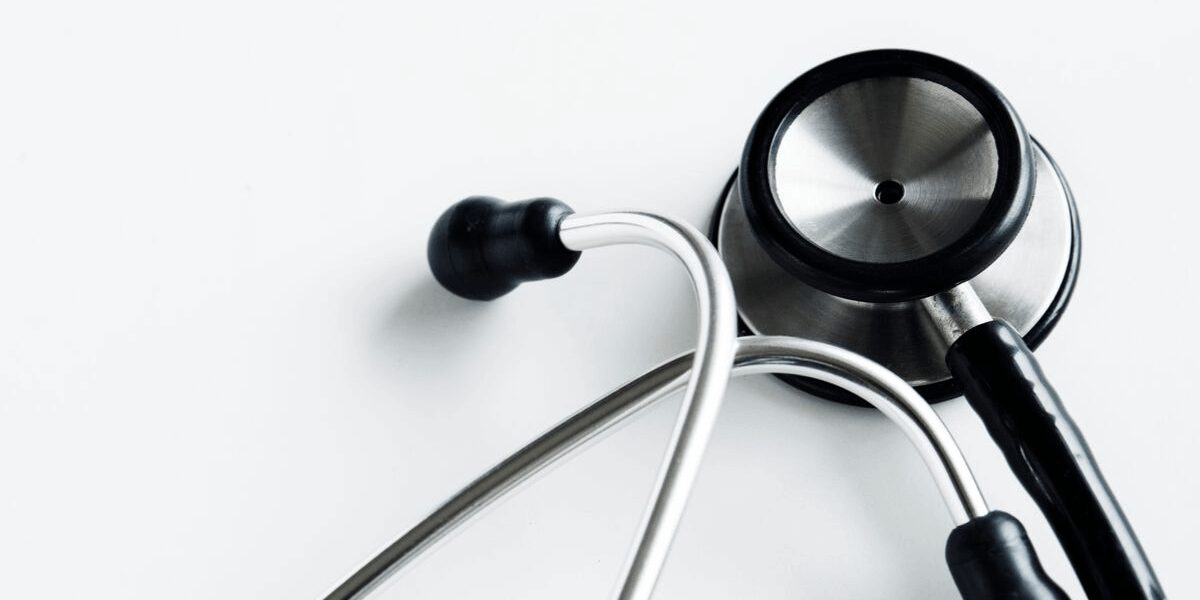

What are the Benefits of Intuitive Eating?
Intuitive eating teaches you to have a healthy relationship with food by empowering you to trust your ability to meet your needs. It helps you distinguish between physical hunger and emotional hunger and ultimately develop body wisdom. This results in improved overall health.
Let’s look at the specific benefits intuitive eating has to offer:
1. Improved Cholesterol Levels
Intuitive eaters have been found to have lower triglyceride levels, higher levels of high-density lipoproteins (HDL), and lower cardiovascular risk. One of the possible reasons for the improved cardiovascular health of intuitive eaters is the improvement in the inflammation marker, C-reactive protein (CRP).
In fact, anyone can benefit from intuitive eating, including those with health challenges. Moreover, it can also help prevent certain health conditions.
2. Lower Stress Levels
In my opinion, this is the most important benefit of eating intuitively. One of the most notable transformations demonstrated in studies that look into intuitive eating is with the psychological health indicators such as better body image and lower incidence of depression and anxiety.
Ditching the diet mentality and breaking free from the cycle of “getting on and off the wagon” will tremendously reduce your stress around food.


3. Increased Energy
Intuitive eating increases your energy by creating a lot of mental space for you. By worrying less about eating, you have more headspace to focus on other priorities in your life.
Research also links intuitive eating with increased motivation to engage in regular physical activity. Women who say that they are internally motivated to eat are more likely to participate in physical activity for pleasure. Therefore, they see themselves as physically active.
In other words, when you eat intuitively, you’ll have more energy and you’ll want to move more. Ultimately, that leads to better health and greater productivity.
4. Improved Mental Health
One of the reasons why diets often fail is that they make you feel bad. Food restriction is associated with negative mood, decreased cognitive functioning, eating disorders, weight obsession, and body dissatisfaction.
On the other hand, a study published in the Cambridge University Press website reveals that there is a substantial and consistent relationship between intuitive eating and improved mental health.
If dieting has made you feel bad about yourself, eating intuitively will make you feel better. Therefore, helping you get into a better mental state.
5. Lower Eating Disorder Occurrence
Those who suffer from eating disorders either restrict food or overindulge. In contrast, intuitive eating resets and balances your eating habits.
Researchers analyzed the eating habits of 2,287 young adults. They found that the participants who followed their hunger and fullness cues were less likely to have eating disorder behaviors than those who didn’t.
Your body instinctively knows what, when, and how much you should eat. In like manner, when you eat intuitively, you trust your body’s wisdom to guide you. You can’t go wrong with that.
6. Improved Body Awareness
Your body has a way of giving subtle signals that are meant to guide you in making the best choices for your health. (We call these signals “body messages” in the Going Beyond the Food community.)
It also lets you know when you have a health problem coming up through the symptoms that you experience. This way, you can take the appropriate steps to deal with the problem before it becomes a crisis.
Intuitive eating is based on interoception-the ability to feel the small sensations in the body such as hunger, fullness, and satisfaction cues. Researchers have found that those who follow their internal eating cues are more sensitive to interoceptive signals.
This means that when you eat intuitively, you get more attuned to those body signals. This will help you with your relationship to food and will enable you to make the right decisions for your overall health.
7. Improved Self-Esteem
The diet culture promotes the “thin ideal.” It assumes that you that if you’re not thin enough and you don’t look a certain way, you’re broken. Therefore, you need to be fixed. It also equates food restriction with moral virtue. Obviously, it’s oppressive and can damage your self-esteem.
In contrast, intuitive eating results in positive body image, better body satisfaction, and improved self-esteem. A positive body image and high self-esteem motivate you to make better choices concerning your health while relying less on willpower.
Inside the Going Beyond The Food Method, we teach our students a unique approach to body image: Body Neutrality. For people who have lived through years of internalized and perhaps externalized body shame for years, body neutrality is the bridge from body hate to body positivity.

8. Increased Level of Happiness
As you can see, intuitive eating can benefit your mental and physical health, and scientific studies prove this. When you become both physically and mentally healthier, your quality of life improves. This translates to an increased level of happiness and contentment.
How to Get Started with Intuitive Eating
Do you want to give Intuitive eating a try? If you are ready to eat better, feel better, and be healthier, we can help you!
You can access all of our services on our work with us page. We have a number of programs and service levels enabling us to serve most women:
Free Resources and Masterclasses: Get started and get to know us better!
Private coaching with Stephanie and her team Stephanie and her team of Certified Non-Diet Coaches are waiting to support you in a one-to-one setting with an individualized plan.
Undiet Your Life group coaching program is for women to learn how to eat intuitively, become body neutral, and learn self-coaching at their own pace while being supported in a group setting by Stephanie and her team of Certified Non-Diet Coaches.
Non-Diet Coaching Certification for professionals ready to integrate the Going Beyond The Food Method™️ in their practice and for women wanting to become Certified Coach and build a business coaching other women beyond the food.
Exercise & Feel the difference
Exercise & Feel the difference.
Why we exercise guides how we exercise.
How we exercise determines and guides what we feel when we exercise.⠀⠀
Exercise should bring pleasure, not pain.⠀⠀⠀⠀⠀⠀⠀⠀⠀
If you are a listener of the Going Beyond The Food Podcast ( we have 100’s of episodes ready for your listening pleasure) you know I have started a new series recently title: She’s Beyond The Food where I share my personal journey going beyond the food. Episode 183 I shared my life journey with exercise which has been for most of my life one of “burning calories” not one of pleasure.⠀
Your journey with exercise⠀⠀⠀⠀⠀
For many of us who have had life long journey of dieting, exercise is something we use to lose weight. Over time that relationship became really painful and in some cases traumatic. I call it “exercise trauma”. ⠀⠀⠀⠀⠀⠀⠀⠀⠀⠀
My relationship to exercise was a source of trauma until I came to Intuitive Eating. Just like an abusive relationship, exercise caused me a lot of pain (in all 4 bodies).
Today’s my form of exercise is walking. Walking in my own backyard or hiking in nature’s setting.
For years I thought that walking wasn’t enough. That walking wasn’t a form of exercise that was strong enough to bring me health.
I needed to sweat and have pain for exercise to be effective. If that you right now I totally get it! I mean that’s what we’re told everywhere right?!?
I just want to share with you that for me that way of thinking got me to one place: “on and off the wagon” of exercise. Meaning I would exercise hardcore for 6 months maybe 1 year and the “fall off the wagon” for 3 years.
Move and Feel the difference⠀⠀⠀⠀⠀⠀⠀⠀
Intuitive Eating taught me that my intention was key to healing my relationship to exercise. I call “exercise” movement today. In part because of the trauma associated with the word exercise.⠀⠀⠀⠀⠀⠀⠀⠀⠀⠀⠀⠀⠀⠀⠀⠀
Intuitive eating recognizes the need for the movement to chase health and ask you to focus on how it makes you feel instead of the calories burned so that you can desire to move because of how it makes you feel.⠀⠀⠀⠀⠀⠀⠀⠀⠀
Intuitive Eating inspires you to focus on the joy you find in moving. Find a form of movement that you desire to do without having to resort to willpower. ⠀⠀⠀⠀⠀⠀⠀⠀⠀
Intuitive Eating teaches us to forget militant exercise and just get moving and feel the difference.
Intuitive Eating is more than just food. It’s a self-care eating framework so yes movement is part of self-care but we seek to find joy in movement instead of calorie burning.
I choose to talk about “movement” instead of “exercise” in all of my programs since many of us have been traumatized by exercise. So simply using a new word make a big difference.
What is intuitive eating?
Intuitive eating is proven and well-researched self-care eating framework that makes YOU the boss of YOU.
Intuitive eating teaches us to have a healthy relationship to food empowering you to trust your ability to meet your needs, distinguish between physical and emotional hunger and ultimately develop body wisdom.
Get started with intuitive eating
If you’d like to explore intuitive eating and discover how it can help you make peace with food download our Get Started with Intuitive Eating Guide.
This free (and highly detailed) cheat sheet will give you a 3 easy to follow step process to help you get started with intuitive eating right away (and give you a shot of confidence to stop dieting … perhaps ).
Chasing Health
Chasing health instead of weight loss is very empowering yet confusing,
What if you took care of the body you have now, instead of the one you wished you had?⠀⠀⠀⠀⠀⠀⠀⠀
⠀⠀⠀⠀⠀⠀⠀⠀
That was my coach’s question… and she added: What would happen if your weight wasn’t the problem?⠀⠀⠀⠀⠀⠀⠀⠀⠀
⠀⠀⠀⠀⠀⠀⠀⠀
I want you to ask yourself this question. Reflect. Go deep.⠀⠀⠀⠀⠀⠀⠀⠀⠀
⠀⠀⠀⠀⠀⠀⠀⠀⠀
I know for me it changed a lot personally and professionally. It actually led me to close my nutrition clinic in Toronto.⠀⠀⠀⠀⠀⠀
“…. but I need to lose weight to be healthy”
To be healthy your body weight must be in the “normal” BMI range. That was my core belief since I can remember and this core belief was validated through my training in nutrition. That’s the core of Diet Culture.⠀⠀
⠀⠀⠀⠀⠀⠀⠀⠀⠀
Diet Culture is is a system of beliefs that worships thinness and equates it to health and moral virtue.
The facts are you can pursue health at any size. We all have the natural person around us that although they maintain their “small body weight” all their life they still are sick today. If health was caused by normal BMI weight then these people would be healthy… right?
⠀⠀⠀⠀⠀⠀⠀⠀⠀
So I strived hard, hustled and spent a whole lot of time figuring out how to be healthy.
As my level of health knowledge evolved the purpose of my hustle change to: “Be healthy and you’ll release the weight” because a healthy body doesn’t hold on to weight. That’s the core of Wellness Diet.⠀⠀⠀⠀⠀⠀⠀⠀⠀
Wellness Diet is the sneaky, modern guise of diet culture that’s supposedly about “wellness” but is actually about performing a rarefied, perfectionistic, discriminatory idea of what health is supposed to look like.
That just another achieve false assumption. Being healthy doesn’t mean you’ll release the weight. That’s just another form of dieting beliefs. ⠀⠀⠀⠀⠀⠀⠀⠀⠀⠀⠀⠀⠀⠀⠀⠀⠀⠀
The truth is health is accessible at any weight. There is another body work dedicated to the research on this field: Health At Every Size.⠀⠀⠀⠀⠀⠀⠀⠀
Chasing Health with intuitive eating
Intuitive Eating teaches that health is more than the number of pounds on the scale. Weight is at best 10% of the contributing factors to health status. Quality and quantity of sleep, stress, emotional stability, quality of thoughts, inflammation level, exposure to toxicity, are just some of the other 90% of the factors that make up our health.⠀⠀⠀⠀⠀⠀⠀⠀⠀
Intuitive Eating is shifting the focus from food and weight loss to honouring your health. By releasing obsession you are creating mental and emotional space to focus on 90% of the factors that contribute to your health.⠀⠀
Intuitive Eating invites you to honour your health. To chase health in your day to day interaction with your body.⠀⠀⠀⠀⠀⠀⠀⠀⠀
⠀⠀⠀⠀⠀⠀⠀⠀
Intuitive Eating teaches you to focus on behaviours that will bring you health including relationships with food, movement, stress, sleep, friends/family, etc. Not just food.⠀⠀⠀⠀⠀⠀⠀
⠀⠀⠀⠀⠀⠀⠀
I’m healthier today than when I was 50 lbs lighter. I’m healthier today than when I consumed 20+ supplements a day. I’m healthier today than when I was Keto, Paleo or Fasting.
What is intuitive eating?
Intuitive eating is proven and well-researched self-care eating framework that make YOU the boss of YOU.
Intuitive eating teaches us to have a healthy relationship to food empowering you to trust your ability to meet your needs, distinguish between physical and emotional hunger and ultimately develop body wisdom.
Get started with intuitive eating
If you’d like to explore intuitive eating and discover how it can help you make peace with food download our Get Started with Intuitive Eating Guide.
This free (and highly detailed) cheat sheet will give you a 3 easy to follow step process to help you get started with intuitive eating right away (and give you a shot of confidence to stop dieting … perhaps ).
⠀⠀⠀
⠀
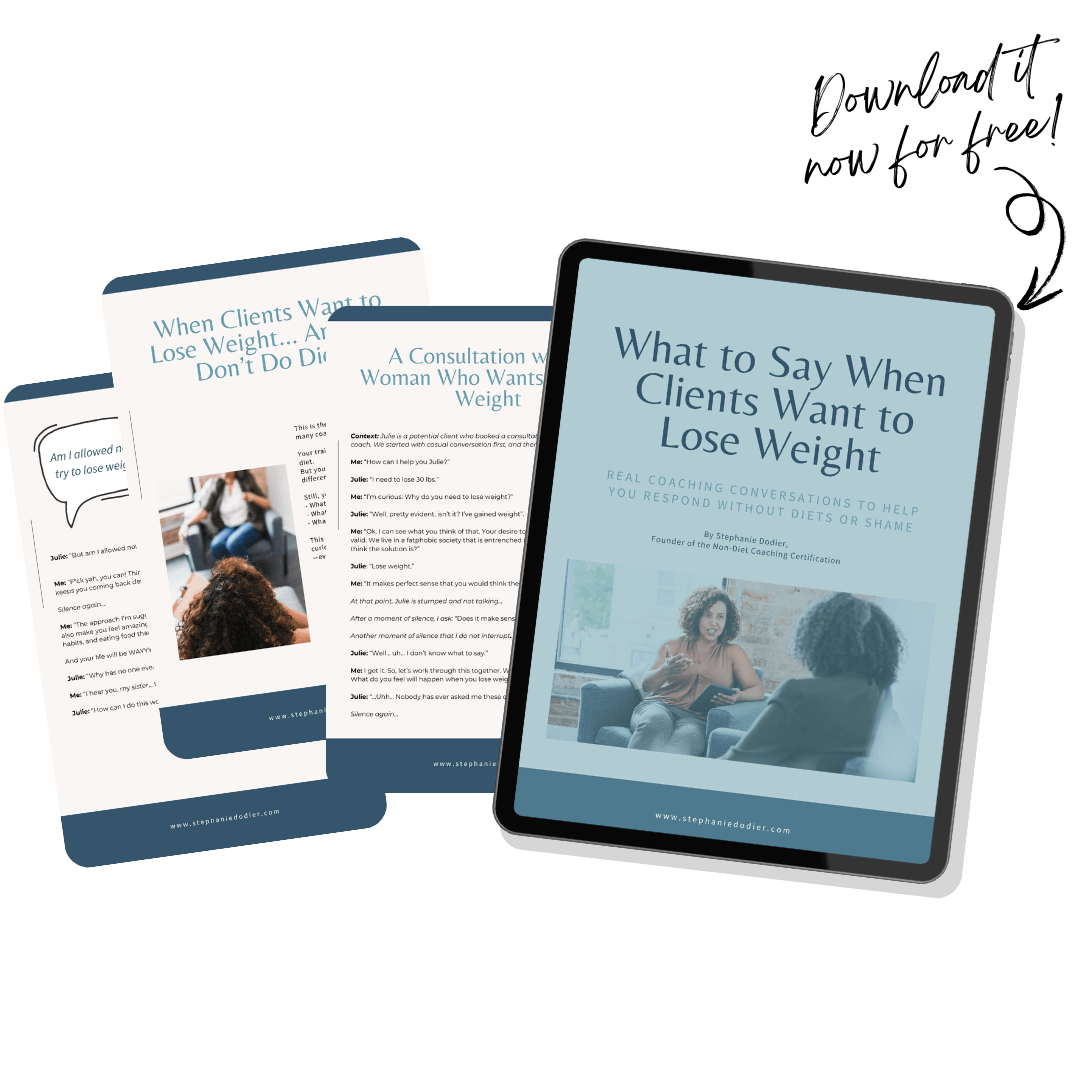

FREE GUIDE
What to say when a client want to lose weight
GET THE EXACT WORDS I USE IN REAL COACHING SESSIONS—WHEN WEIGHT LOSS COMES UP AND I’M HOLDING A WEIGHT-NEUTRAL STANCE


FREE GUIDE
What to say when a client want to lose weight
Get then exact word I use in real coaching session when weight loss comes up and I'm holding a weight-neutral stance


Welcome!
I’m Stephanie Dodier
I am a non-diet nutritionist, educator, and feminist business leader challenging everything we’ve been taught about food, health, and coaching.
I help health professionals confidently coach food and body without co-opting diet culture.
Join me in leading the health coaching revolution!
Ready? Let's do this!

